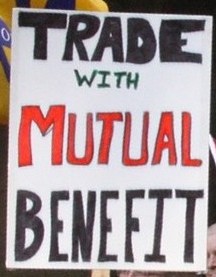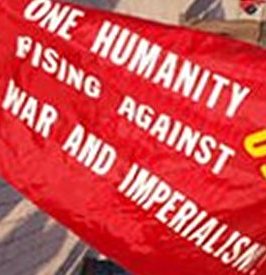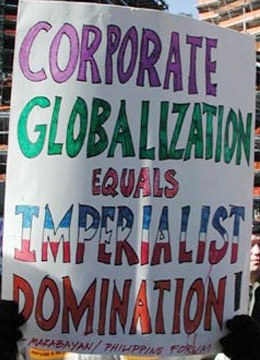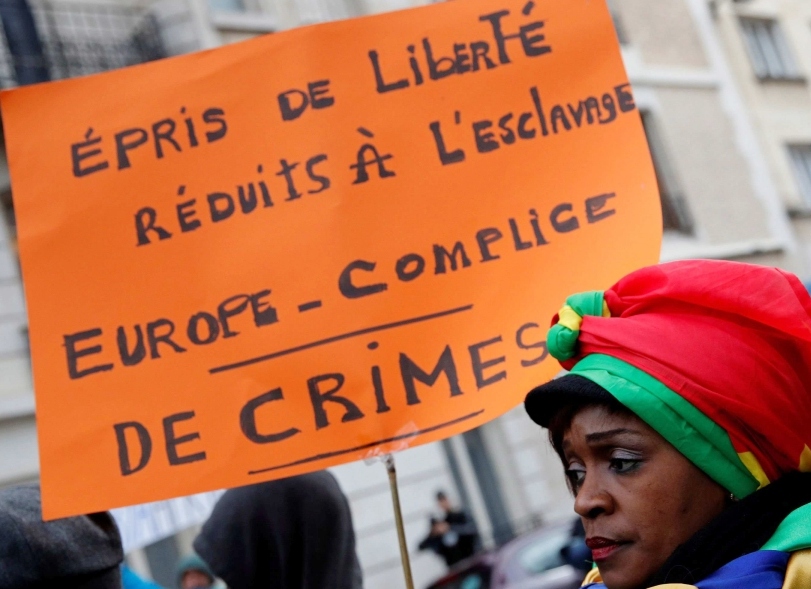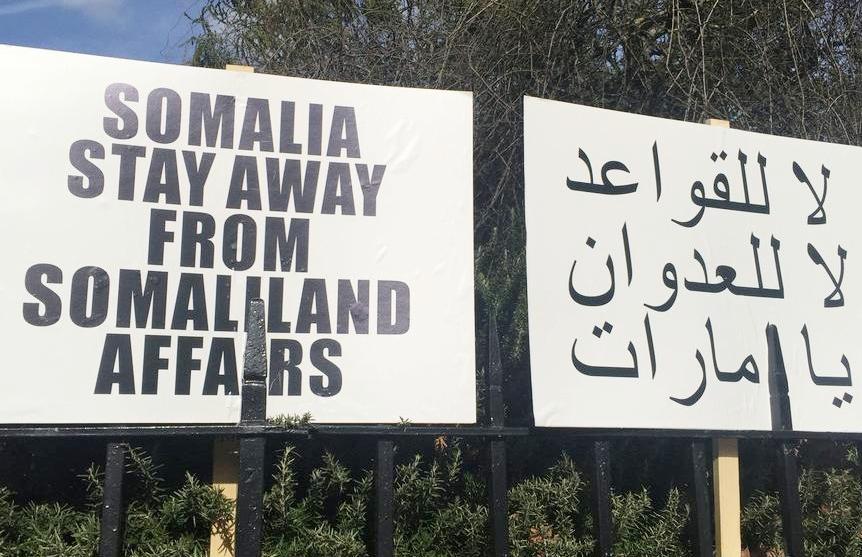
|
April 7, 2018 - No. 13 Necessity for a New Direction for International Trade International Trade as a Weapon of Exploitation, Chauvinism and War
New
Scramble
for
Africa Necessity for a New Direction for International Trade International Trade as a Weapon of
|
None of this clarifies what is meant by "peacekeeping" today. Nor does it reveal the real purpose of Canada's presence in Africa along with that of the U.S., Britain, France, Germany and others. Chief of Defence Staff General Jonathan Vance told a press conference that the Chinook helicopters would be used for medical evacuations but could also be used for transporting other UN troops and equipment, while the Griffons would act as an "armed escort" and possibly also be used "for support to ground forces." Vance indicated that final decisions around the number of helicopters and personnel would not be made until after a military team was able to visit Mali and the multinational camp in Gao, saying a lot more details were still needed. Planners also still need to consult with the Germans, whose air support operation Canada will be replacing, he said.
Meanwhile, the CBC reported that the government confirmed it will send "up to six helicopters and as many as 250 aircrew and troops" to Mali this summer.
A statement by the Department of National Defence said the new "peace operation" is a result of commitments the government made at the Vancouver Peacekeeping Summit it hosted with the U.S. in November 2017. At that time, Canada announced it was dedicating up to 600 troops and 150 police officers to what are defined as "peace operations." Since the announcement, the government and media have done everything possible to divert attention from the real reasons Canada is joining the U.S. in its rivalry with other European powers and China in Africa in the name of peacekeeping. One diversion is the emphasis on Canada's prevarication because it failed to announce where it would deploy its troops. Canada's statement also referred to another commitment yet to be announced of a "Quick Reaction Force and accompanying equipment." A third commitment, for "a tactical airlift support to .... transport UN troops, equipment, and supplies to their missions," was announced in November as being for "one or two" C-130 Hercules aircraft to support the UN's Regional Support Centre in Entebbe, Uganda. It is said to be in the preparation stage currently.
When evaluating what Canada is doing in Mali it is
important to consider amongst other things that Mali is Africa's
third-largest gold producer and eighth in the world. Along with Niger,
Mali also has large deposits of uranium. According to Natural Resources
Canada, Canadian mining assets in Mali in 2016 were $1.529 billion held
by 12 companies. In 2015, 15 companies held $1.221 billion in
assets. Companies with stakes in industrial gold mines in Mali include
Randgold, AngloGold Ashanti, B2Gold, IAMGOLD and Hummingbird Resources.[3],[4]
Those with stakes in uranium mining include Cascade Resources Ltd.,
Northern Canadian Uranium Inc., Rockgate Capital Corp. and Oklo
Resources Ltd.
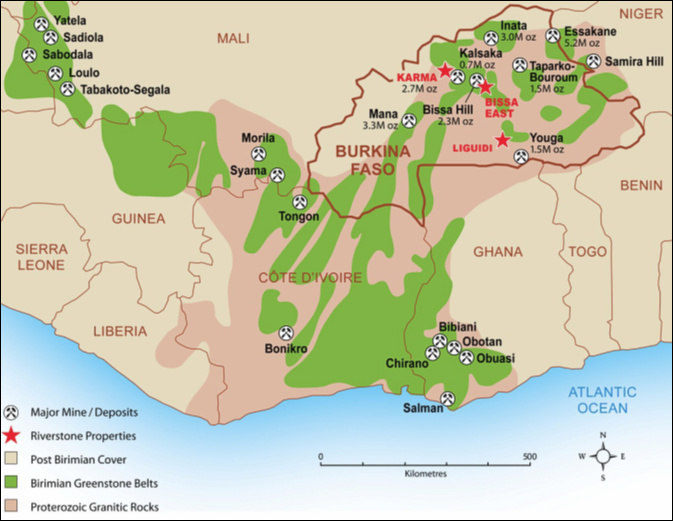
Natural Resources Canada 2012 map of major mines and gold deposits in
Mali and
neighbouring countries.
The government of Mali is in the midst of changing its mining code. Mali's Minister of Economy and Finance Boubou Cisse told reporters on March 16 that existing "protections" against changes to the 30-year-old mining code would be reduced. "The negotiations are underway. If they don't pan out, it will be a unilateral decision like in [Democratic Republic of the Congo (DRC)]," Cisse said. Cisse's remarks led to "concerns" from mining companies in Mali.
On March 20, a day after Canada officially announced its expanded military presence in Mali, Canadian-based B2Gold issued a statement "responding to news" regarding the new Mali mining code. It says that: "statements attributed to a Government Minister at a recent joint news conference with the International Monetary Fund suggested that if compromises with mining companies are not achieved, amendments to the mining code may be unilaterally implemented. The full details of any proposed new mining code and the timing for its implementation are not known at this time. Government officials have advised the Company that the Minister's comments were taken out of context in such news report and should not be applied to all mining operations in Mali."
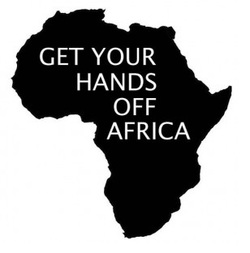 It asserted that B2Gold's "interest in its
Fekola Mine in
Mali is governed by a finalized and enforceable mining convention
(as amended) with the State of Mali that includes stabilization
provisions which provide that the Fekola Mine is subject to the
Mali Mining Code (2012) for the duration of its
operations and
subsequent amendments to the Mali Mining
Code are not applicable
to it. As a result of these provisions, the Company believes its
interests in Fekola are protected and that any contemplated
amendments in a new mining code will not apply to Fekola without
B2Gold's agreement." The B2Gold statement added, "No Malian government
representative
has informed any B2Gold representatives in Mali or elsewhere that
the government does not agree with the Company's position."[5]
It asserted that B2Gold's "interest in its
Fekola Mine in
Mali is governed by a finalized and enforceable mining convention
(as amended) with the State of Mali that includes stabilization
provisions which provide that the Fekola Mine is subject to the
Mali Mining Code (2012) for the duration of its
operations and
subsequent amendments to the Mali Mining
Code are not applicable
to it. As a result of these provisions, the Company believes its
interests in Fekola are protected and that any contemplated
amendments in a new mining code will not apply to Fekola without
B2Gold's agreement." The B2Gold statement added, "No Malian government
representative
has informed any B2Gold representatives in Mali or elsewhere that
the government does not agree with the Company's position."[5]
The agreement between B2Gold and the Malian government over its Fekola project, however, is subject to final ratification by the Mali National Assembly, which is expected at their next scheduled sitting in April.
The presence of the forces of the U.S., Canada and European powers in Mali, as in other strategic African countries, is part of a new scramble for Africa which causes harm to the peoples of that continent. In the name of fighting terrorism and peacekeeping, inter-imperialist rivalries for domination of Africa and the world are escalating. It is very important for Canadians to step up their work to make Canada a zone for peace and oppose the presence of Canadian troops abroad in the name of peacekeeping.
Notes
1. While the government presents its UN mission in Mali as something new, it in fact represents an expansion of Canada's military involvement in Mali and the region. Writing in the Globe and Mail on March 19, Geoffrey York says, "Canada has...sent hundreds of soldiers to Mali since 2010 in a multimillion-dollar effort to help train the Malian army in counterterrorism, border security and other priorities. Much of this training was led by the U.S. military under a U.S.$500-million counterterrorism program." York notes that one of the graduates of that training program led a 2012 military coup against the government of Mali.
On January 14, 2013, Prime Minister Stephen Harper announced that Canada would participate in a French-led military intervention in Mali, a former French colony. He said a Royal Canadian Air Force C-17 military transport aircraft would be provided "for a period of one week" in response to a request from the French government for military assistance. This was subsequently extended to one month. The intervention was generally supported by both the NDP and Liberals who spoke in favour of Canada's role and even called for it to be made longer lasting and to extend more broadly in the region.
A report on the Canadian Armed Forces website states that a total of 48 airlifts were carried out between January 15 and March 31, 2013 in support of France's "joint combat operation" with government of Mali forces. At the time, Harper said the aircraft was providing "logistical support" and that it would not participate in "direct combat" or operate in zones where direct combat was taking place. This claim contradicted the plane's daily shipments of military hardware and equipment to French forces that had begun a ground offensive in Mali against those it said were terrorists.
The Harper government steadily increased Canada's military presence in Africa, especially in the Sahel region. Fifty Canadian Special Forces were sent to Mauritania, which shares an eastern border with Mali, for 'training,' TML Weekly reported in 2013. Canadian Special Forces were also said to be training the military forces of Niger, another country which neighbours Mali to the east.
Canada continues to train Niger's military forces today under Global Affairs Canada's Counter-Terrorism Capacity Building Program. Information about this operation on the Canadian Armed Forces website makes clear that it is "not part of any peace support operation."
The website notes that since 2015 Canada has been transporting French military equipment and personnel between France and countries of the Sahel region of Africa in support of France's Operation Barkhane. Canada's airlifts -- the most recent at the end of February -- are Code-named Operation Frequence and are reported to be "in support of international counterterrorism efforts in the region."
2. The Sahel stretches from the Atlantic Ocean eastward through northern Senegal, southern Mauritania, the great bend of the Niger River in Mali, Burkina Faso (formerly Upper Volta), southern Niger, northeastern Nigeria, south-central Chad, and into Sudan.
3. Canadian mining assets in countries bordering Mali:
Burkina Faso
2015: $2.287 billion -- 14 companies
2016: $2.180 billion -- 13 companies
Mauritania
2015: $1.338 billion -- 4 companies
2016: $1.392 billion -- 4 companies
Guinea
2015: $12 million -- 7 companies
2016: $12 million -- 4 companies
4. For information about IAMGOLD's operations in Mali and Burkino Faso see here.
5. The Fekola project is an open pit gold mine situated in southwestern Mali, on the border between Mali and Senegal. The mill for the mine was completed in October 2017 and has commenced processing ore. At that time, the company announced that gold production from the Fekola Mine in 2017 was forecast to be between 100,000 and 110,000 ounces, "far surpassing the upper end of the original guidance of 45,000 to 55,000 ounces, and exceeding its reforecast production guidance range of between 50,000 and 55,000 ounces."
(With files from CP, CBC, Al Jazeera, Xinhua)
Spurious Justifications of Britain, France and
the EU
for Intervention in Africa
The annual Anglo-French summit meeting took place on January 18 with a high-level meeting at the Royal Military Academy, Sandhurst between Prime Minister Theresa May and President Macron. Although the summit's agenda was presented as wide-ranging, it was evident that increasing military activity and what is referred to as security co-operation was at the heart of the meeting. What was particularly evident, was increasing intervention in the affairs of African countries by France and Britain both to prevent what is described as the threat of "Islamist-terrorism" in the Sahel and to establish the borders of the European Union (EU) firmly in that region allegedly to control the flow of migrants to Europe and prevent modern forms of slavery.
|
|
Ostensibly for these purposes the government announced that it was deploying three Chinook helicopters to Mali, where the French army has been engaged in what it claims are counter-terrorism activities since at least 2012. The French mission, known as Operation Barkhane, is based in Chad and has involved over 4,000 French troops as well as air support deployed in Chad, Mali, Burkina Faso, Mauritania and Niger, which are all former French colonies. According to the French government Barkhane was established primarily in the interests of France and Europe not those of Africa. The British government has also been contributing to this activity since at least 2016 when Defence Secretary Michael Fallon announced that the RAF would routinely airlift French troops in the region. The U.S. army also has troops and special forces in neighbouring Niger, as well as Burkina Faso and Cameroon. Amongst other things, the U.S. military is involved in regular drone surveillance of Mali from its base in Niger. The U.S. military have been engaged in what they refer to as counter-terrorism activities in the area even before the French, indeed from 2002, even before there was any evidence of "terrorist" activity.
These military activities have been stepped up following the military intervention in Libya by the Anglo-French coalition and other NATO powers in 2011. Since that time, the country has been in a state of almost total anarchy, with rival governments and militias vying for power, and parts of the country in the hands of so-called Islamic State and other sinister organizations, the very forces that were supported and financed by the NATO powers with the aim of regime-change in Libya. The neighbouring countries and the entire Sahel has also become affected by similar instability, which has contributed to the problems of mass migration, people trafficking and a modern slave trade throughout the entire region. It is allegedly to counter these problems created by military intervention that the governments of Britain and France are engaged in more military intervention.
These military activities exist alongside the EUCAP Sahel Niger mission, part of the EU Common Security and Defence Policy (CSDP), begun in 2012 to allegedly give "security" advice to the government of Niger. Already over 120 representatives of European security forces and justice departments are deployed in Niamey, the country's capital. Since 2014 EUCAP personnel have also been deployed in central Niger, specifically to deal with migration and other perceived threats to Europe and in regular liaison with other CSDP missions including EUCAP Sahel Mali, the EU Training Mission in Mali, UN Multidimensional Integrated Stabilization Mission in Mali (MINUSMA) and the EU Border Assistance Mission (EUBAM) Libya, which "supports the Libyan authorities in developing border management and security." In addition, the French government and the EU have also been organizing and funding the so-called G5 Sahel Joint Force, launched in 2017 and comprising military forces from the five African countries in the Sahel, which is also to be deployed throughout the region.
The intervention by the EU and its allies in the Sahel, which has also involved economic interference and so-called "aid," has done nothing to prevent instability or mass migration to Europe. Nor have the so-called migrant reception centres and other measures in Libya which were widely condemned, even by the UN High Commissioner for Human Rights who referred to EU policies as "inhuman" even before the centres were revealed as key institutions for people trafficking and enslavement by the media late last year. "The increasing interventions of the EU and its member states have done nothing so far to reduce the level of abuses suffered by migrants," the UN's High Commissioner for Human Rights said. "Our monitoring, in fact, shows a fast deterioration in their situation in Libya."
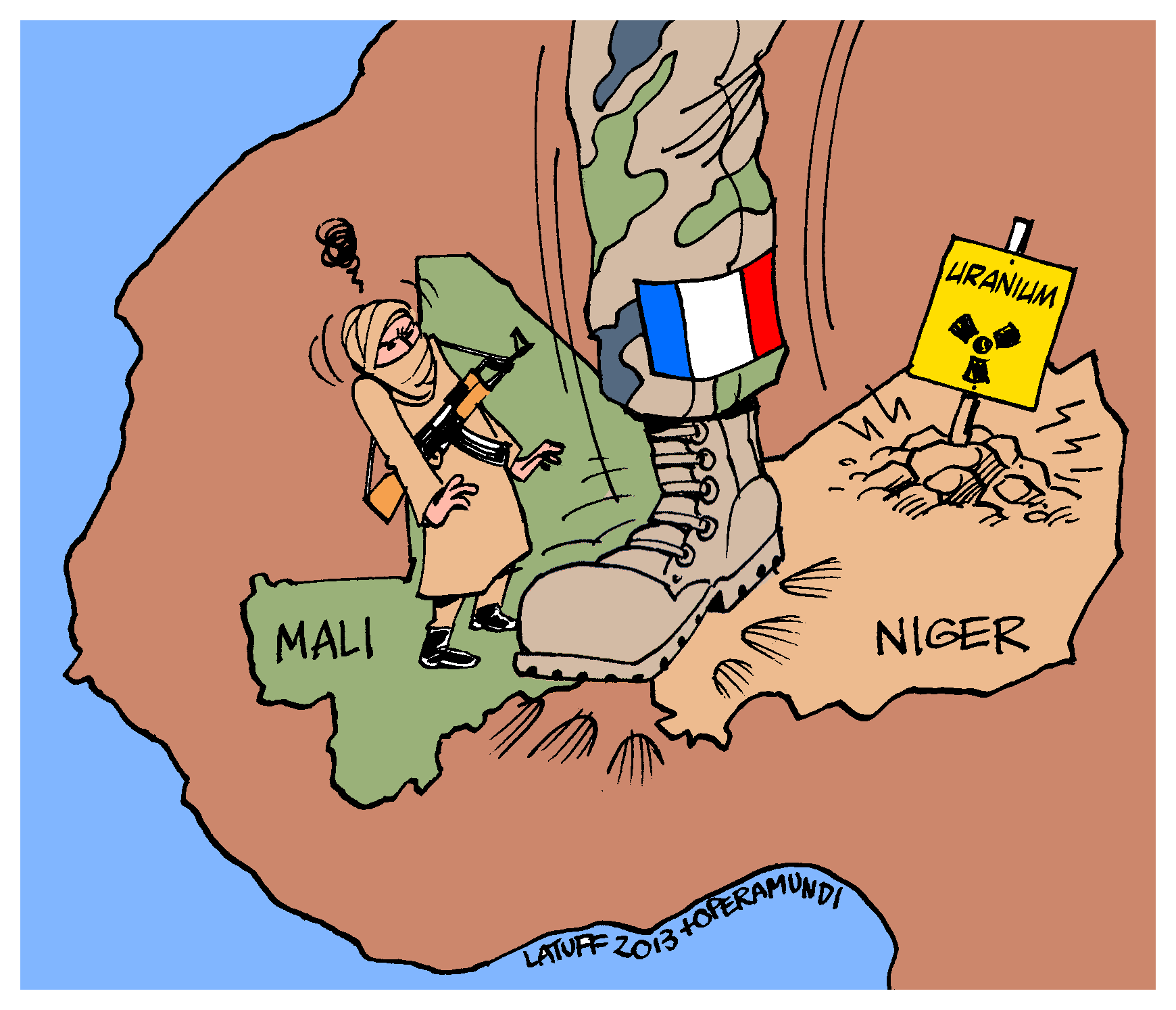 Although the intervention of
Britain, France and other
EU
countries across the Sahel is presented as humanitarian activity
or allegedly to combat terrorism it cannot be forgotten that the
region is also of growing economic importance. Both Mali and
Niger contain important deposits of uranium mined by the French
nuclear power monopoly Areva, which is largely state-owned. Areva
is a major player in the development of the planned Hinkley Point
nuclear power plant in Britain. In Niger, the world's fourth
largest producer of uranium, Areva was the major player until the
arrival of China Nuclear International Uranium Corporation broke
its monopoly in 2007. China is also playing a major role in oil
and gas exploration in Niger in rivalry with the U.S. and others,
while in Mali it is making major investments in infrastructure as
well as uranium, oil and iron ore exploration. Despite the poverty
of its populations and large areas of desert, the entire Sahel is
a region in which the big powers are vying for economic and
geo-political advantage. These activities too have created
instability as well as increasingly violent opposition to foreign
interference.
Although the intervention of
Britain, France and other
EU
countries across the Sahel is presented as humanitarian activity
or allegedly to combat terrorism it cannot be forgotten that the
region is also of growing economic importance. Both Mali and
Niger contain important deposits of uranium mined by the French
nuclear power monopoly Areva, which is largely state-owned. Areva
is a major player in the development of the planned Hinkley Point
nuclear power plant in Britain. In Niger, the world's fourth
largest producer of uranium, Areva was the major player until the
arrival of China Nuclear International Uranium Corporation broke
its monopoly in 2007. China is also playing a major role in oil
and gas exploration in Niger in rivalry with the U.S. and others,
while in Mali it is making major investments in infrastructure as
well as uranium, oil and iron ore exploration. Despite the poverty
of its populations and large areas of desert, the entire Sahel is
a region in which the big powers are vying for economic and
geo-political advantage. These activities too have created
instability as well as increasingly violent opposition to foreign
interference.
The military intervention by Britain, France, the U.S. and others and the measures taken in North Africa and the Sahel have not prevented the mass human exodus that is a consequence of impoverishment and economic underdevelopment caused by colonial and neo-colonial rule, and more recent neo-liberal globalization. Rather, it has added to the increasingly inhuman treatment of migrants and the loss of thousands of lives. In addition, the mass movement of people is a direct result of the instability and armed conflicts in the world, caused largely by the intervention of Britain and the other big powers. Nor has military intervention in the region eliminated what is referred to as terrorism and other criminal activities, quite the reverse is the case.
The response of Britain and the other big powers is to use the consequences of intervention, such as the anarchy in Libya and instability in Mali, as the justification for further intervention in Africa in line with their geo-political and other aims. This course of action will only exacerbate such problems and bring further suffering to millions. There is an urgent need for the people of Britain and other European countries to take a stand against the actions of the EU and the other big powers which are creating such havoc and suffering throughout the world.
Workers' Weekly is a
publication of the Revolutionary Communist Party of Britain
(Marxist-Leninist).
(February 3, 2018)
For
Your Information
United Nations Stabilization Mission in Mali

Protest in Cairo, Egypt, January 8, 2013, against French intervention
in Mali.
The UN Multidimensional Integrated Stabilization Mission in Mali (MINUSMA) was established by an April 2013 Security Council resolution following France's intervention in January of that year. The official mandate of the mission as established by the UN Security Council was to support political processes in that country and carry out a number of security-related tasks. The Mission was tasked to "support the transitional authorities of Mali in the stabilization of the country and implementation of the transitional roadmap." In 2014 the mandate was expanded to "focus on duties, such as ensuring security, stabilization and protection of civilians; supporting national political dialogue and reconciliation; and assisting the re-establishment of State authority, the rebuilding of the security sector, and the promotion and protection of human rights in that country."
As of December 2017, MINUSMA's mission was made up of 11,617 troops and 1,746 police. It is widely considered the UN's most deadly peacekeeping mission with 162 MINUSMA personnel having been killed to date, many as a result of direct attacks on UN operations and bases.
The mission's headquarters is in Bamako. In the UN Secretary-General's December 2017 report to the Security Council it is stated that MINUSMA has established another force headquarters forward command post in Sévaré, which serves as a liaison to coordinate action between MINUSMA force units and non-UN missions in the region, with those named being the G5 Sahel force, France's Operation Barkhane and the European Training Mission. The report indicates that "all international and Malian forces meet quarterly to determine common strategic objectives and coordination."
Countries providing troops to the UN mission are: Bangladesh, Benin, Burkina Faso, Cambodia, Cameroon, Canada, Chad, China, Denmark, Egypt, El Salvador, Estonia, Finland, France, Germany, Ghana, Guinea, Guinea-Bissau, Indonesia, Italy, Ivory Coast, Jordan, Liberia, Mauritania, Nepal, the Netherlands, Niger, Nigeria, Norway, Portugal, Rwanda, Senegal, Sierra Leone, Sri Lanka, Sweden, Switzerland, Togo, United Kingdom, United States of America, Yemen. The top ten troop-contributing countries in descending order are listed as Burkina Faso, Chad, Bangladesh, Senegal, Togo, Guinea, Niger, Germany, China and Egypt.
Timeline of MINUSMA Operations
April 6, 2012: the Economic Community of West African States (ECOWAS), of which Mali is a member, brokers a framework agreement between the Malian government, which has been overthrown by a coup d'état from within its military, and the forces that have overthrown it. The coup forces agree to give up power in return for an amnesty and the lifting of the sanctions ECOWAS had imposed on them. The parties also agree to a timetable for a return to constitutional rule and elections.
November 11, 2012: ECOWAS announces plans to deploy 3,300 troops for an African-led International Support Mission to Mali (AFISMA). The mission is endorsed by the UN Security Council.
December 20, 2012: the UN Security Council adopts resolution 2085 under Chapter VII authorizing the deployment of AFISMA for an initial period of one year.
January 11, 2013: France launches a full-scale invasion of Mali named Operation Serval, which it claims has been requested by the interim government, aimed at stopping "Islamic militants from the north of Mali." France's military action gets military support from Belgium, Canada, Chad, Denmark, Germany, Netherlands, Spain, Sweden, United Arab Emirates, the UK and the United States. Much of the support is in transporting French forces but also includes surveillance and "advisors" of various kinds who are to be based in Mali.
February 2013: France provides an update on Operation Serval to the UN Security Council, at which time there are "some initial discussions" about a future UN peacekeeping mission in Mali.
April 25, 2013: the UN Security Council establishes the UN Multidimensional Integrated Stabilization Mission in Mali (MINUSMA) to take over from the AFISMA mission while France's military intervention in its former colony carries on. The Security Council resolution authorizes a UN force structure of 11,200 military personnel and 1,440 police personnel.
October 2013:
the
UN
Security
Council
is
briefed
on
serious
challenges
facing
MINUSMA
reaching
its "full operational capacity," alleging that "recent
terrorist attacks" are "an important wake-up call." From this point
forward there are regular attacks against MINUSMA as well as French
forces. Calling them terrorist attacks has been a means of hiding that
the attacks are against a foreign military intervention.
July 2014: an inter-Malian negotiation process begins in Algiers.
August 2014: France launches Operation Barkhane, its follow-up to Operation Serval. With the new operation, France expands the military invasion from Mali to the entire Sahel region, claiming the goal is to fight terrorism.
October 2014: UN Under-Secretary-General for Peacekeeping Hervé Ladsous reports that MINUSMA is "no longer operating in a peacekeeping environment," citing the ongoing attacks on military forces.
March 2015: the government and a coalition of armed groups initial a peace agreement while a second coalition of armed groups involved in negotiations with the government of Mali request more time to consult with their constituency before signing.
April 2, 2015: a UN inquiry found that a UN police unit has used "unauthorized and excessive force on civilians," killing three Malians and wounding four others who were protesting the UN mission.
June 2015: a peace agreement is signed by all parties and a ceasefire goes into effect.
August 2015:
the
ceasefire
is
violated,
leading
to
clashes.
Ongoing
clashes
continue
between
armed
groups as do attacks on MINUSMA personnel.
June 2016 and June 2017: the mandate of the MINUSMA mission is extended, each time for one year. The mandate contains a provision which authorizes French forces, that are not part of the UN mission, to intervene in support of "elements of MINUSMA" when under imminent and serious threat upon the request of the Secretary-General.
February 2017: the G5 Sahel joint force is announced integrating the militaries of Mali with those of surrounding countries (Burkina Faso, Mauritania, Niger and Chad) to operate alongside the French, UN and EU forces.
January 2018: the government of Mali and the coalitions of armed groups operating in the country say they will implement the remaining obligations under the Agreement on Peace and Reconciliation in Mali by the end of March 2018.
February 2018: the UN Mali Sanctions Committee holds its first meeting in preparation for enforcing sanctions in Mali.
Foreign Military Bases in Africa
United States
|
|
In 2015 the United States publicly disclosed that it has 46 U.S. bases of different types in Africa, after claiming for years it only had one. Previously secret documents obtained through a Freedom of Information Act request revealed what has long been known which is that the U.S. operates various levels of outposts across Africa. The documents divide the bases into three categories: forward operating sites, cooperative security locations and contingency locations.
According to the documents, forward operating sites are the most permanent and contingency locations the least so. The various bases form the backbone of U.S. military operations on the continent and have been expanding at a rapid rate, particularly since September 2012. Documents also note that any of the cooperative security locations can easily be "scaled up" to function as a "major logistics hub."
Ascension Island: The base on this Territory of the United Kingdom on the west coast of Africa and Camp Lemonnier in Djibouti are considered "enduring locations" with sustained troop presence and "U.S.-owned real property," serving as hubs for staging missions across Africa.
Burkina Faso: A cooperative security location in Ouagadougou is said to provide "surveillance and intelligence over the Sahel."
Burundi: There is a contingency location in Bujumbura.
Botswana: In 2016 outgoing U.S. Army Africa commander Maj. Gen. Darryl Williams announced that a cooperative security location was being built in Botswana
Cameroon: Garoua airport in northern Cameroon is a drone base used against Nigerians. It houses unarmed Predator drones and some 300 U.S. soldiers.
Chad: Predator and Reaper drones are based in the capital, Ndjamena. There is a contingency location in Faya Largeau.
Central African Republic: U.S. special forces are based in Obo, Djema and Sam Ouandja.
Democratic Republic of Congo: Dungu is listed as a "temporary site."
Djibouti: Camp Lemonnier is a 200-hectare expeditionary base housing some 3,200 U.S. soldiers and civilians next to the international airport. Home to the Combined Joint Task Force-Horn of Africa of the U.S. Africa Command, this was long claimed to be the only permanent U.S. military base in Africa.
Chabelley Airfield, a former French Foreign Legion post, is a regional hub for unmanned aircraft for Africa and the Middle East. According to an article in The Nation, "By the beginning of October 2015, for example, drones flown from Chabelley had already logged more than 24,000 hours of intelligence, surveillance, and reconnaissance missions and were also, according to the Air Force, 'responsible for the neutralization of 69 enemy fighters, including five high-valued individuals" in Iraq and Syria.
Ethiopia: A small drone facility at Arba Minch, operational since 2011 but now said to have closed, is listed as a contingency location.
Gabon: A base in Libreville was listed in 2015 as a "proposed" cooperative security location in released documents but was actually used in 2014 and 2015 as a key base for Operation Echo Casemate, the joint U.S.-French-African military response to unrest in the Central African Republic.
Ghana: There is a cooperative security location in Accra.
Kenya: Camp Simba in Manda Bay is a base for naval personnel and Green Berets. It also houses armed drones for operations in Somalia and Yemen. There is a contingency location in Lakipia, the site of a Kenyan Air Force base; and another Kenyan airfield at Wajir that was upgraded and expanded by the U.S. Navy earlier in this decade.
Liberia: There is a contingency location in Monrovia.
Mali: Both Bamako and Gao are listed as contingency locations. Gao is the base of the UN Mission in Mali where Canada will send military advisors to determine the full scope of Canada's mission according to Canada's Chief of Defence Staff.
Mauritania: There are contingency locations in both Ouassa and Nema.
Niger: A base in Niamey is listed as a contingency location.
Nigeria: A Nigerian military base at Agadez is listed among the "proposed" cooperative security locations in released documents. The United States is, in fact, pouring $100 million into building up the base, according to a 2016 investigation by The Intercept.
Somalia: U.S. commandos are operating from compounds in Kismayo and Baledogle.
South Sudan: Nzara is listed as a contingency location. Nzara airfield is reported to be a base for U.S. troops searching for Joseph Kony, and related surveillance operations. U.S. special forces have also provided training to South Sudanese troops.
The Seychelles: Drone operations are carried out from a base on the island of Victoria.
Senegal: There is a cooperative security location in Dakar.
Tunisia: The U.S. has been flying drones at an air base here.
Uganda: PC-12 surveillance aircraft fly from Entebbe airport as part of U.S. special forces operations. Kasenyi is also listed as a contingency location.
France
Chad: Headquarters of France's anti-insurgent Operation Barkhane, its roughly 3,500 French troops operate in Burkina Faso, Chad, Mali, Mauritania and Niger.
Cote d'Ivoire: The facility at Port-Bouët, a suburb of Abidjan, is to be expanded from 500 to 900 men and form a forward operating base for West Africa.
Djibouti: The base for a long-standing French military presence, now comprising roughly 1,700 personnel.
Gabon: A key base that has contributed troops to France's interventions in Central African Republic.
United Kingdom
Kenya: A permanent training support unit is based mainly in Nanyuki, 200 kilometres north of Nairobi.
Germany
Niger: An air transport base at Niamey
international airport supports Germany's military presence in Mali.
United Arab Emirates
|
|
Eritrea: In 2015, the United Arab Emirates (UAE) began developing the deepwater port of Assab and its 3,500-metre runway, capable of landing large transport planes. Assab is now the UAE's main logistics hub for all military operations in Yemen, including the naval blockade of the Red Sea ports of Mokha and Hodeida.
Libya: UAE operates counter-insurgency attack aircraft and drones from Al-Khadim airport in eastern Libya.
Somalia: UAE trains and equips Somalia's counterterrorism unit and National Intelligence and Security Agency. It has a 30-year lease on a naval and airbase at the port of Berbera in Somaliland, an autonomous region of Somalia which has declared itself independent. The BBC has reported that the UAE intends to establish its own base there.
Saudi Arabia
Djibouti: In 2017 Saudi Arabia signed a military cooperation agreement with Djibouti that includes an agreement for Saudi Arabia to build a new base. Djibouti is a member of the Saudi-led coalition which is waging a war of aggression in Yemen.
Turkey
Somalia: Turkey has a training facility for Somali troops.
China
Djibouti: China has established a logistics base which it says is for resupplying Chinese vessels on peacekeeping and humanitarian missions at the port of Obock. The base will have the capacity to house several thousand troops. It lies next to the Doraleh Multipurpose Port, partly operated by China Merchants Holdings.
India
Madagascar: India's first foreign listening post, set up in 2007, is said to be for monitoring ship movements in the Indian Ocean and to listen in on maritime communications.
The Seychelles: Land has been allocated on Assumption Island for India to build its first naval base in the Indian Ocean region.
Japan
Djibouti: Since 2011, a contingent of 180 troops has occupied a 12-hectare site next to U.S. Camp Lemonnier. In 2017, plans were made to expand the base.
(With files from Irinnews.org, The Nation, TomDispatch, BBC)
Affirmation of Indigenous Peoples' Rights
Vigorous March and Rally Against
Kinder Morgan Pipeline Expansion

Despite constant rain, about 500 people participated in a loud and vigorous march and rally affirming Indigenous peoples' rights on the evening on April 5. Demonstrators gathered in front of the Vancouver Art Gallery and marched along city streets to rally outside the site where Prime Minister Justin Trudeau was the star attraction at a $1,000 a plate Liberal Party fund-raising dinner.
The march and rally were extremely energetic with near constant banging of pots and pans, Indigenous drumming, singing and shouting of slogans, especially Hey Hey! Ho Ho! Kinder Morgan Has Got to Go! and No Consent. No Pipeline! Among the numerous banners, signs and placards carried by demonstrators were Respect Indigenous Sovereignty; No Consent. No Pipeline; Democracy or Oilocracy?; Diversify Our Economy; Justin Trudeau Climate Criminal; Our Security Lies In Our Fight for the Rights of All; Our Demands Most Modest Are: We Only Want the Earth; and For a Modern Canada Which Defends the Rights of All. All Out to Build the New.
Copies of the TML Weekly article, "Renewal of the Political Process Is Necessary to Stop Monopolies From Imposing Their Will On the People," were well received by the crowd.
The rally was addressed by several Indigenous speakers. Chief Bob Chamberlain, vice-president of the Union of BC Indian Chiefs stated, "This does not have First Nations Consent. We value the environment more than money." Chamberlain called on everyone to participate in the next actions outside the First Nations' "Watch House" and the Kinder Morgan Terminal on Burnaby Mountain, Saturday, April 7.
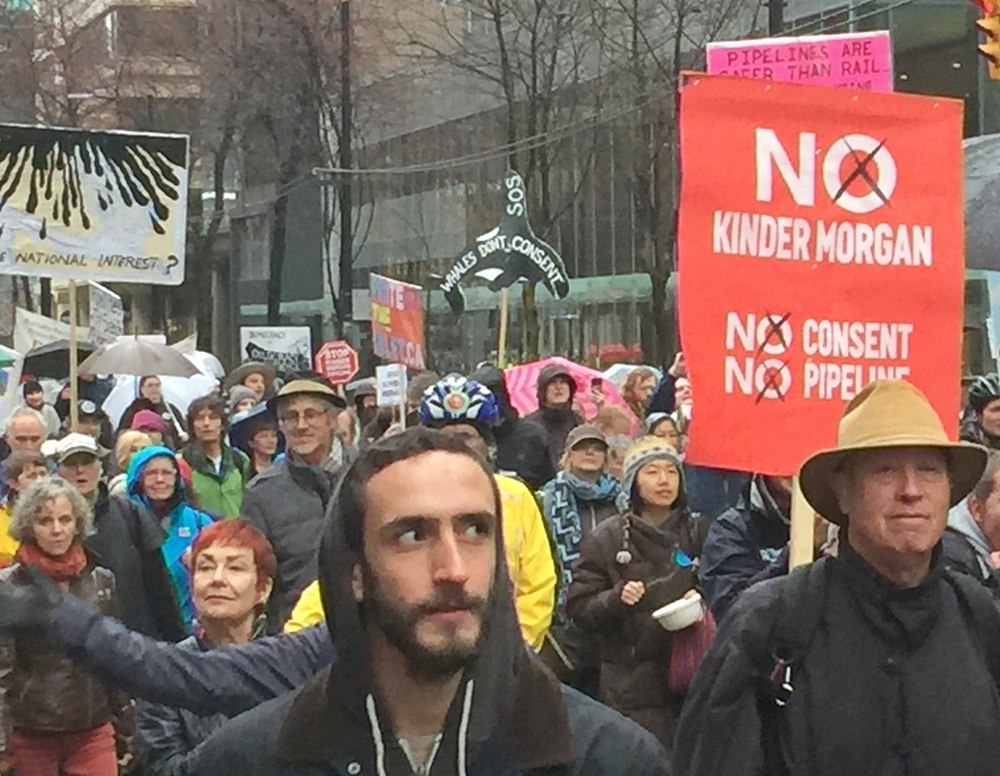
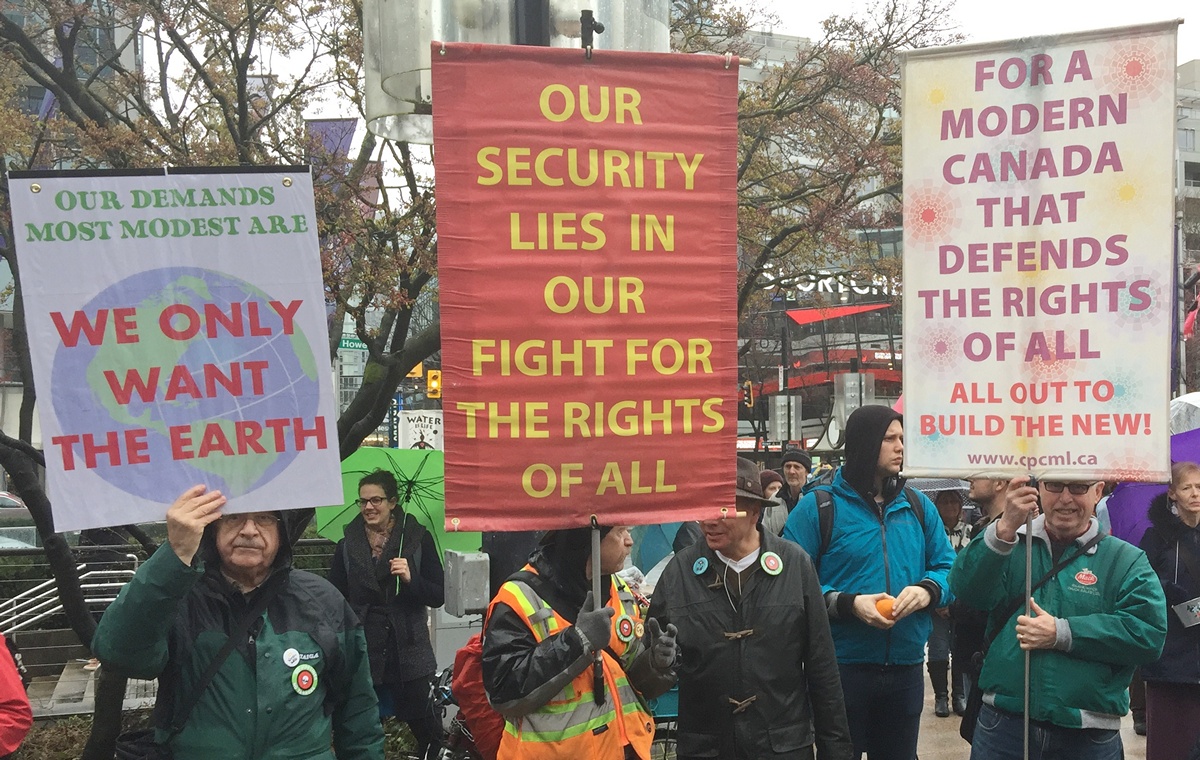
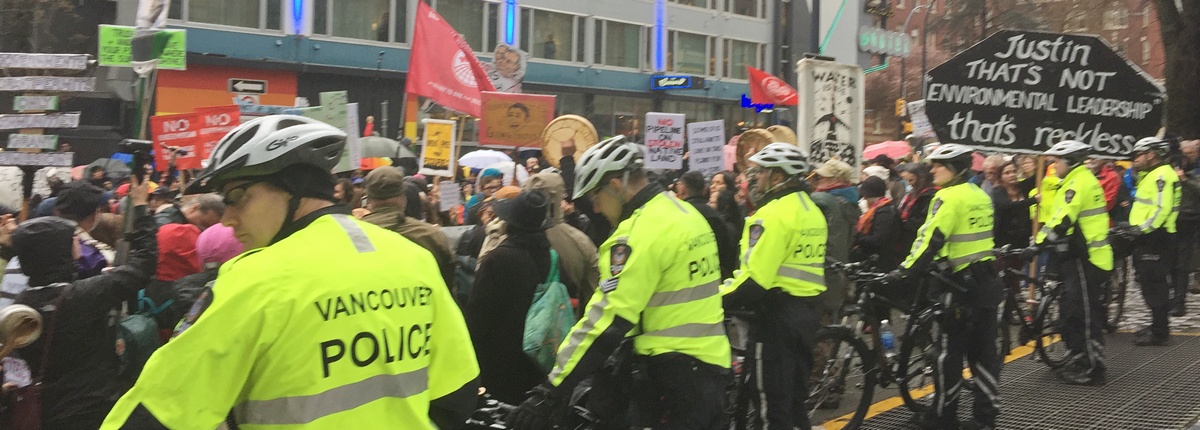

Struggle for Peace on Korean Peninsula
Perspective on Upcoming
Inter-Korean and
U.S.-DPRK Summits
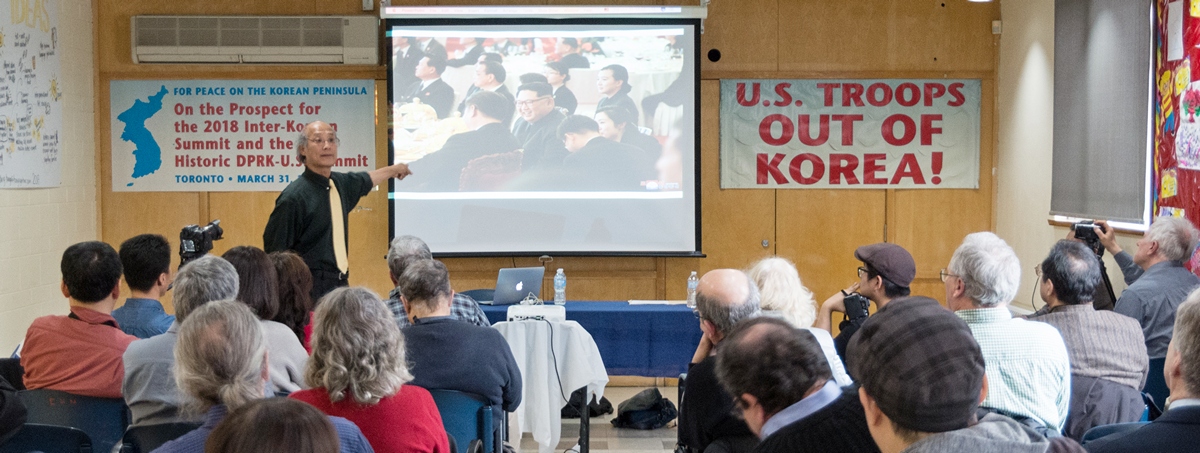
A very lively meeting was held during the afternoon of
March 31 in downtown Toronto with Professor Kiyul Chung of the 21st
Century Institute based in Washington DC. Prof. Chung is also an
Associate Professor at Kim Il Sung University in Pyongyang and at
universities in China and Japan. Prof. Chung shared his thoughts about
the upcoming third Inter-Korean Summit between Kim Jong Un, leader of
the Democratic People's Republic of Korea (DPRK) and Moon Jae-in,
President of the Republic of Korea (ROK) scheduled April 27 on south
Korean territory in Panmunjom at the Demilitarized Zone that divides
the Korean nation. He also gave his views on the planned DPRK-U.S.
Summit set for May where Kim Jong Un will meet U.S. President Trump.
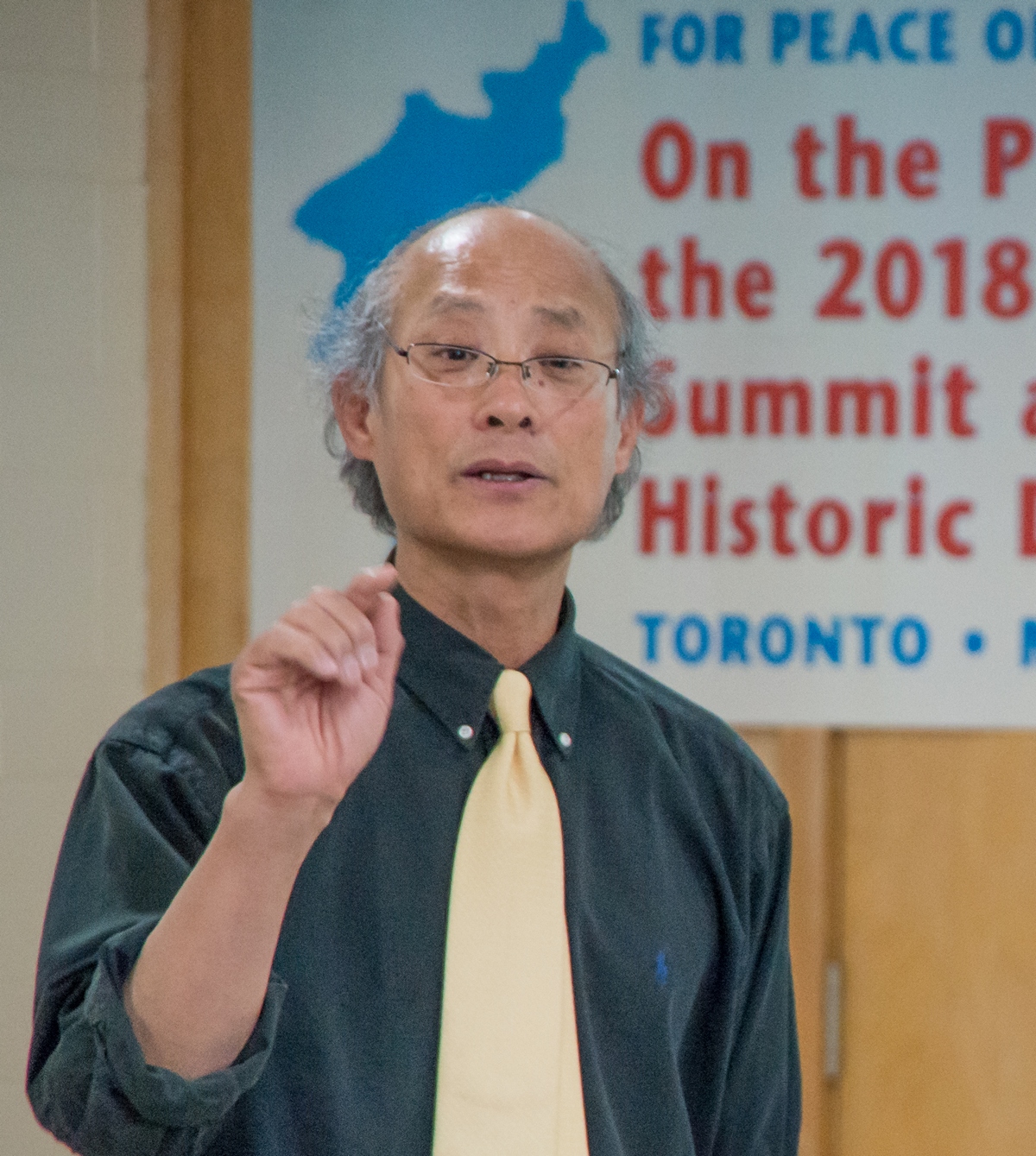 This public event was
organized by the Korea Truth Commission (KTC) (Canadian Chapter) and
the Korean Federation in Canada. Philip Fernandez, spokesperson of the
KTC (Canadian Chapter), in his welcoming remarks noted that Prof. Chung
had been in Toronto twice before. His first visit was in connection
with organizing the Korea Truth Commission's historic People's
International War Crimes Tribunal in New York City on June 23, 2001, in
which a delegation of 60 Canadians took part. Fernandez also pointed
out that at this People's Tribunal, a panel of jurists from countries
around the world, including Canada, found the U.S. administrations,
from 1945 to the time of the tribunal, guilty of crimes against peace,
war crimes, and crimes against humanity that were committed against the
peace-loving Korean people, before, during and after the Korean war,
and called for financial compensation and an apology from the U.S.
This public event was
organized by the Korea Truth Commission (KTC) (Canadian Chapter) and
the Korean Federation in Canada. Philip Fernandez, spokesperson of the
KTC (Canadian Chapter), in his welcoming remarks noted that Prof. Chung
had been in Toronto twice before. His first visit was in connection
with organizing the Korea Truth Commission's historic People's
International War Crimes Tribunal in New York City on June 23, 2001, in
which a delegation of 60 Canadians took part. Fernandez also pointed
out that at this People's Tribunal, a panel of jurists from countries
around the world, including Canada, found the U.S. administrations,
from 1945 to the time of the tribunal, guilty of crimes against peace,
war crimes, and crimes against humanity that were committed against the
peace-loving Korean people, before, during and after the Korean war,
and called for financial compensation and an apology from the U.S.
The main point Prof. Chung made during his almost
two-hour long presentation was that there is a sea change taking place
on the Korean Peninsula. It has found expression recently in the joint
Korean team at the PyeongChang Winter Olympics, the subsequent meeting
of south Korean officials with Kim Jong Un on March 3 and the plans for
the upcoming Third Inter-Korean Summit on April 27, as well as the
DPRK-U.S. Summit in May. He stated that a new situation has
materialized whereby the DPRK has earned for itself a strong position
from which it commands respect as an equal, sovereign country. Even the
most hawkish political advisers to U.S. President Trump are forced to
admit that there is no military solution to the crisis on the Korean
Peninsula and that the only approach left is to hold direct talks with
the DPRK, something that would have been unthinkable 20 years ago. He
gave credit for this achievement to the DPRK's uncompromising stand in
defence of its right to self-determination, in the face of great
difficulties, and its development of a strong deterrent to any
aggression against its territory.
Prof. Chung pointed out that the attitude of the present
south Korean government toward the DPRK has created the space for
renewed initiatives toward co-operation between north and south. He
noted that for the first time since the Second World War, a south
Korean President has been brought to power by a mass movement of the
people, with the election of President Moon Jae-in in an effort to rid
themselves of the corrupt administration of Park Gyeun-hye. Prof. Chung
said President Moon Jae-in has expressed his desire to re-establish
relations between the DPRK and ROK in the first of his two terms in
office -- relations destroyed by the two most recent U.S.-installed
puppet regimes of Lee Myung Bak and Park Gyeun-hye.
 Prof. Chung attributed great
significance to the meeting between President Xi Jinping of China and
Kim Jong Un when the latter visited Beijing from March 26 to 28. He
noted that, in his opinion, based on the warm fraternal and historic
reception that Kim Jong Un received in Beijing from President Xi, it
can be concluded that the relationship between the two neighbouring
peoples has reached a new stage. He observed that the recent situation
where China has not taken a principled stand to defend and support the
DPRK but instead contributed to its demonization is now a thing of the
past and it intends to play a bigger role in ensuring peace and
stability on the Korean Peninsula.
Prof. Chung attributed great
significance to the meeting between President Xi Jinping of China and
Kim Jong Un when the latter visited Beijing from March 26 to 28. He
noted that, in his opinion, based on the warm fraternal and historic
reception that Kim Jong Un received in Beijing from President Xi, it
can be concluded that the relationship between the two neighbouring
peoples has reached a new stage. He observed that the recent situation
where China has not taken a principled stand to defend and support the
DPRK but instead contributed to its demonization is now a thing of the
past and it intends to play a bigger role in ensuring peace and
stability on the Korean Peninsula.
In the question and answer session that followed the main presentation,
Prof. Chung elaborated these points. He said that he is optimistic that
the upcoming summits will create new opportunities for the Korean
people to work together for their national aspiration for peace and
reunification. He pointed out that in the March 3 meeting in Pyongyang
between the envoy of President Moon and Kim Jong Un, the latter gave
his assurance to President Moon that the DPRK has no intention of
attacking the ROK and that he would do everything possible to move
inter-Korean relations forward as one people and one nation.
Philip Fernandez informed the meeting of the continuing
work of the KTC (Canadian Chapter), particularly circulating the Korea
Peace Petition, and called on everyone to join this work at the
upcoming pickets and to circulate the petition amongst their family and
friends. He noted that close to 3,200 Torontonians have signed the
peace petition, expressing their active sentiment for peace on the
Korean Peninsula.
Henry Na, the Toronto correspondent for MinPlus news in south Korea, informed that he is heading to Pyongyang to participate in the Pyongyang Marathon on April 8 and invited everyone to sign a large Unified Korea flag that he is planning to present to the people of the DPRK.
Prof. Chung thanked everyone for their participation. He
hopes to be back in Canada at the end of May and a public meeting will
be organized at that time so that he can update Torontonians on the
results of the Inter-Korean summit as well as the DPRK-U.S. summit
between Kim Jong Un and President Trump.
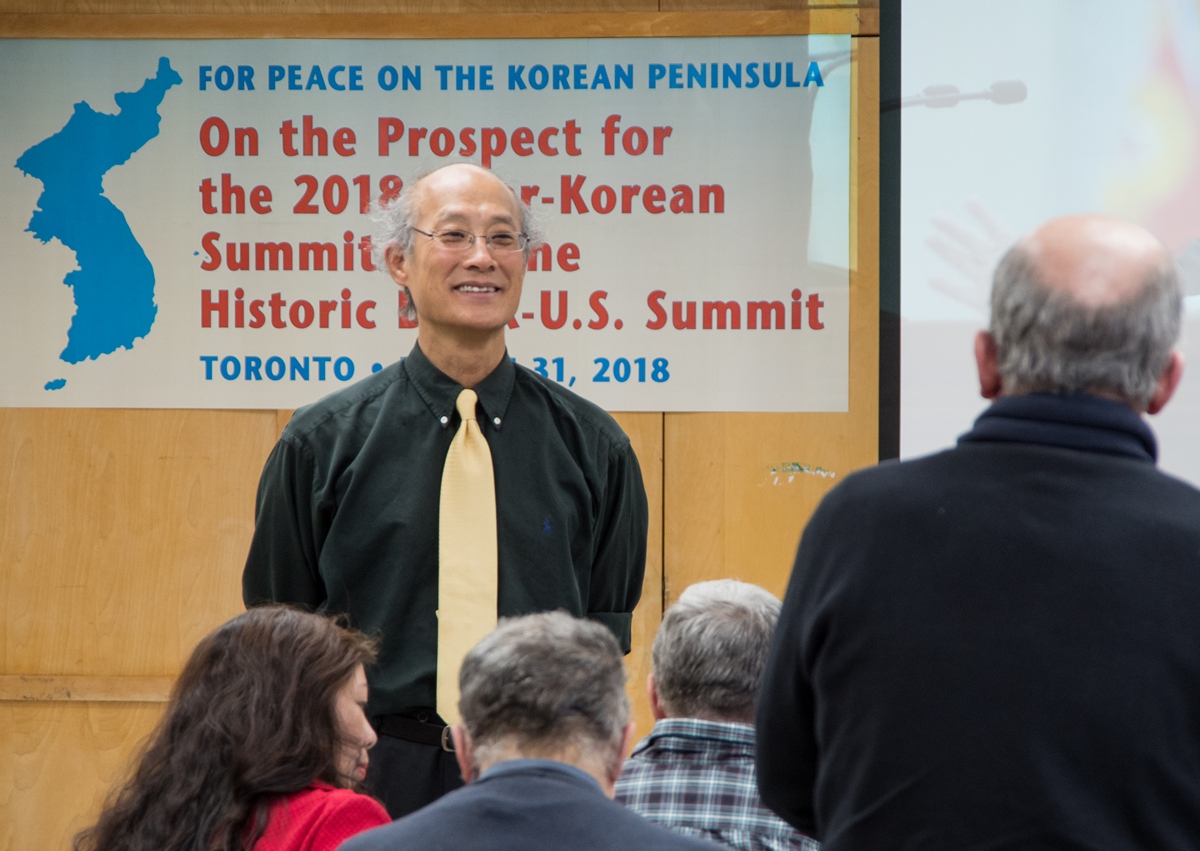


Ongoing Crisis in United States Education System
Teachers in Kentucky, Oklahoma and Arizona
Demand
Increased
Funding for Education

Thousands of teachers attend walkout rally at Capitol building in
Oklahoma City, April 2, 2018.
More than 72,000 teachers in Kentucky and Oklahoma have staged a walk out against low wages and worsening working conditions. Some teachers point out that they have to work two or more jobs to keep body and soul together and, due to cut-backs in funding for education, they have to pay from their own pockets for the materials that their students need. These teachers join those in West Virginia who went on strike for a week in February and March to fight for a wage increase and to safeguard their pensions. Slogans carried by the teachers make clear that being able to do their jobs not only means receiving proper wages but also requires proper funding for the education system as a whole so that students have the conditions they need for their education and to have a bright future.
With youth and students across the U.S. in action to oppose violence and increased police measures in schools and militarization of communities, the students themselves are taking a clear stand to support their teachers and defend their right to education.
The monopoly-controlled media keeps shouting that the U.S. economy is doing really well, but people have a hard time making ends meet. One young woman said that she works more than 70 hours a week in three different jobs to pay her bills. This is the reality of ordinary people in the U.S., while big corporations have been getting tax breaks and the military has been given hundreds of billions of dollars.
Situation in Oklahoma

Teachers rally in Oklahoma City, April 2, 2018.
Thirty thousand teachers in Oklahoma began
their walkout
on April 2. The week before, Governor Mary Fallin signed
legislation awarding the teachers a 15 to 18 per cent salary
increase. However, Oklahoma teachers rank 49th out of 50 states
and the District of Columbia in terms of wages and the increase
was far less than the teachers' demand. The Oklahoma Legislature
also did not address the need for a wage increase for educational
assistants, nor increase funding for students. Oklahoma's
public revenue per student ranks 47th out of 50 states and the
District of Columbia. Teachers point out that textbooks are
falling apart and outdated, while basic equipment like desks and
chairs are broken, on top of which classes are overcrowded.
Oklahoma has had the highest cuts to education -- state funding
for education has been cut by more than 28 per cent per student
over the past 10 years -- and the teachers want the cuts
reversed.
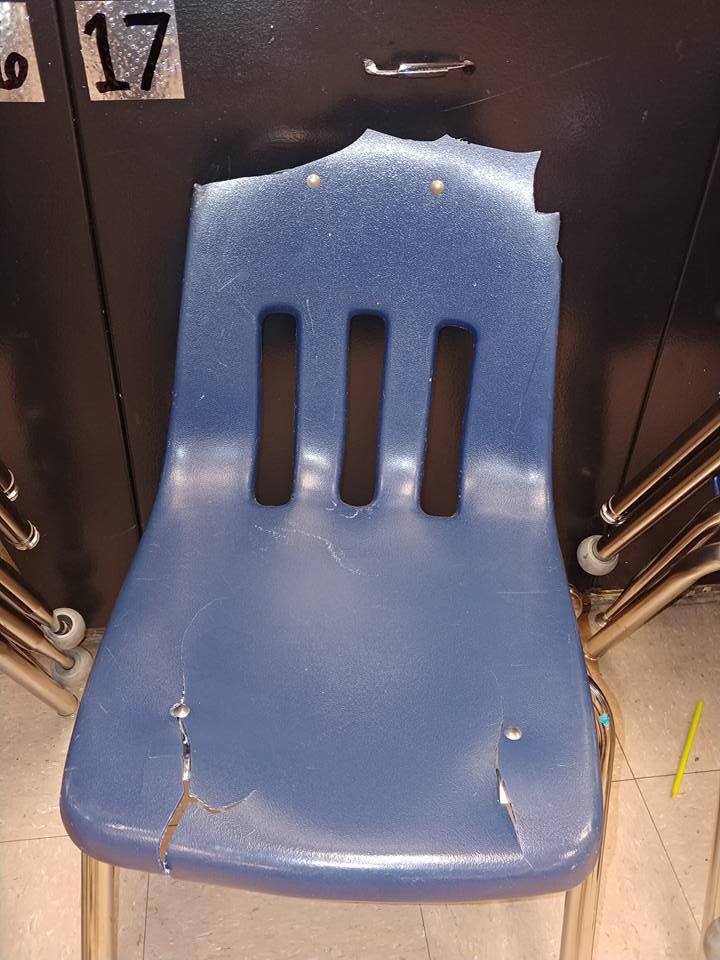
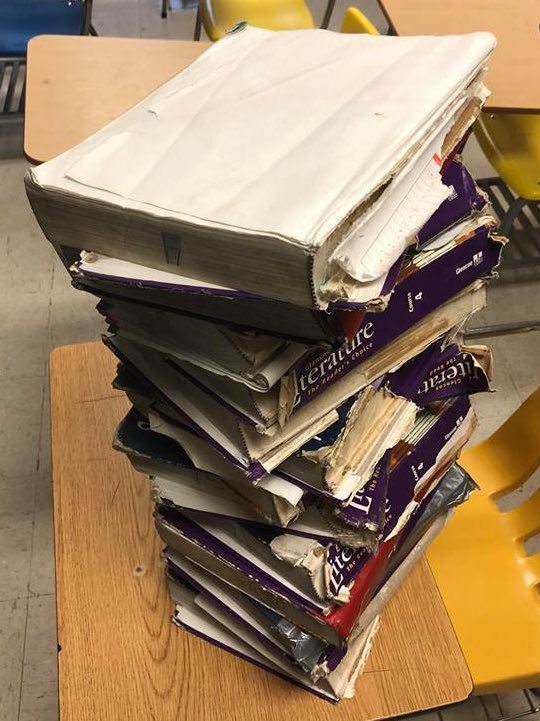
Photos of broken furniture and outdated and crumbling textbooks in
Oklahoma schools have galvanized public support behind the just demands
of teachers and students for a properly funded public education system
that allows teachers to teach and students to learn.
"We won't let anyone disinvest in public education. We are here for the long haul," Alicia Priest, head of the Oklahoma Education Association, told a mass rally outside the Capitol building in Oklahoma City on April 2.
On April 4, a group of more than 100 education workers began a 110-mile (177-kilometre) march from Tulsa to Oklahoma City, to join the teachers rallying at the Capitol building. The march is estimated to take a week. Brendan Jarvis, a seventh-grade geography teacher at Union public schools in Tulsa, explained the reason for the march: "We do appreciate the raise. The main reasons that teachers are walking are because of the lack of funding for classrooms, the things that affect kids [...] We're marching for the kids, for better school supplies, so teachers don't have to buy all of them out of pocket."
"We are willing to walk 100 miles for our students,"
Patti
Ferguson-Palmer, President of the Tulsa Classroom Teachers
Association, told the Tulsa World. "What is the Oklahoma
Legislature willing to do? We are not all young and fit."

Teachers on the march from Tulsa to Oklahoma City, April 4, 2018.
The courageous stand of the teachers to defend the
public
education system and all those who comprise it is receiving broad
support. Deborah Gist, the superintendent of schools in Tulsa,
said those walking have already received a lot of support, saying
that there was "Honking and waving, thumbs up, [people] blowing
kisses. Some would stop and offer assistance, people were
bringing food. It was just really wonderful to see."
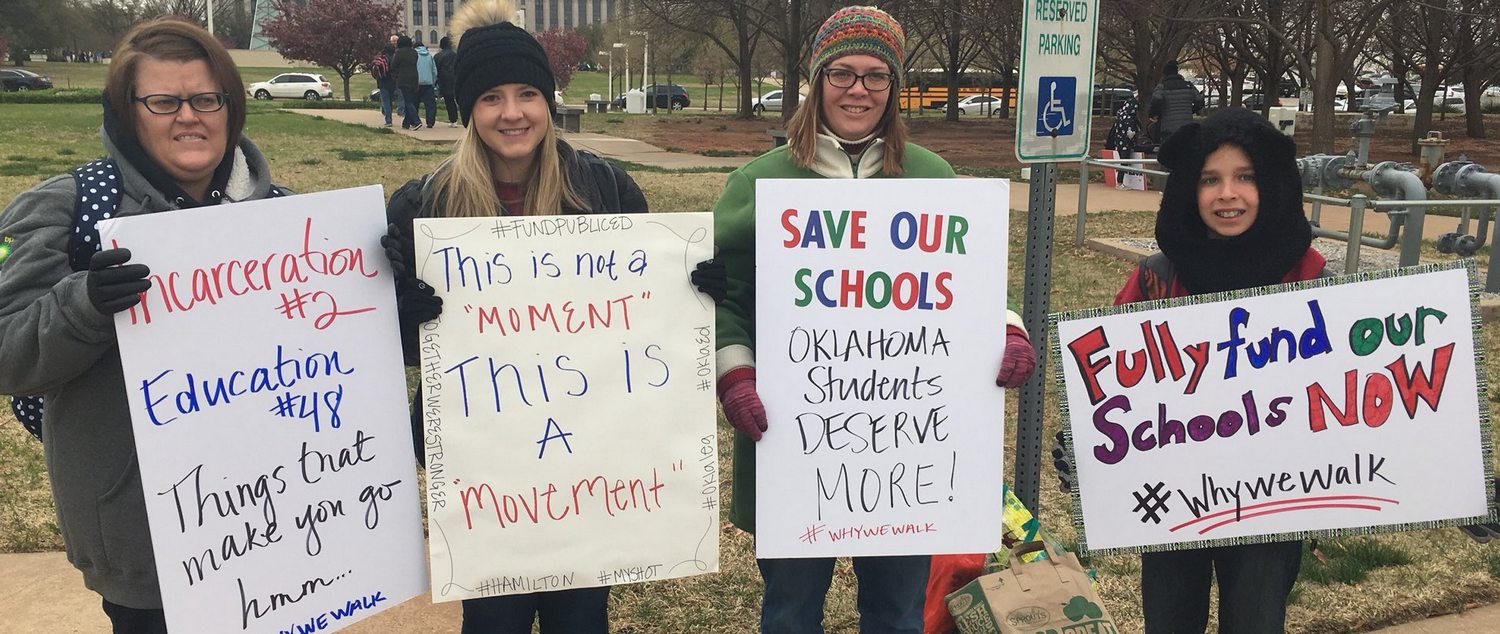


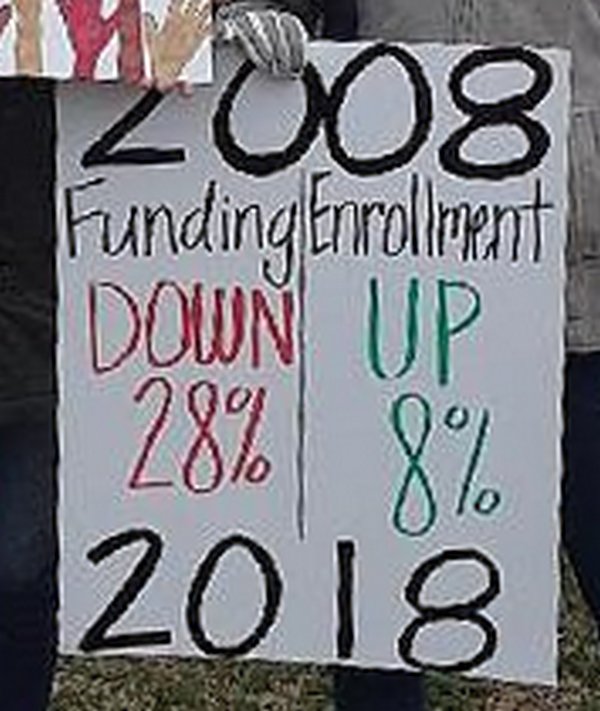
Signs at the April 2, 2018 rally at the Capitol building in Oklahoma
City.
Situation in Kentucky

Kentucky teachers rally at the Capitol building in Frankfort, April 2,
2018.
Teachers in Kentucky are rallying outside the Capitol building in Frankfort to oppose an attack on their pensions and other cuts to the education system that affect them and their students. Many Kentucky schools are on Spring Break, while those school districts that are not on break shut down due to a mass walkout by teachers. As in Oklahoma, there is broad support for the teachers from parents and students. As stated by the President of the Kentucky Educators Association (KEA) Stephanie Winkler at the mass rally in Frankfort on April 2, "Education is not a partisan issue."
On April 4, the KEA issued the following call to Governor Matt Bevin to veto the attack on their pensions:
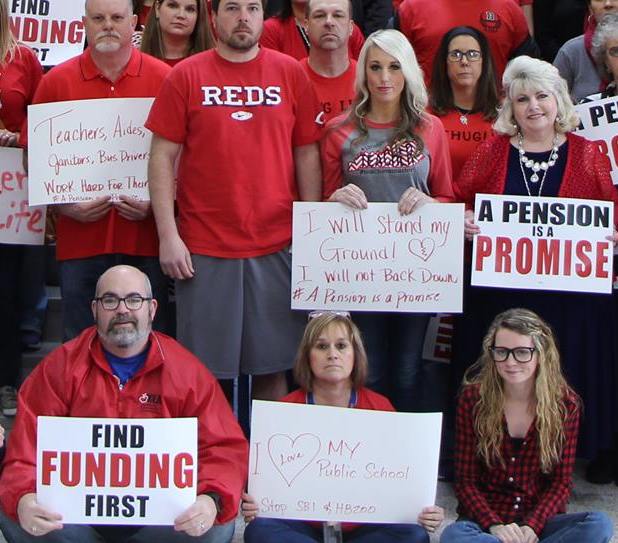 "Kentucky's educators call on
Governor Bevin to do
what's
right for future generations of Kentuckians and veto Senate Bill
151. Kentucky already faces a severe shortage of public education
employees in all categories. In 2013, legislators implemented a
hybrid cash balance scheme for education support professionals,
all of whom participate in the County Employee Retirement System.
Predictably, ever since that time, school districts have been
faced with shortages of bus drivers, custodians, food service
workers, paraeducators, and all other categories of necessary
student supports. Now the legislature has implemented the same
scheme for all new teachers, creating a significant disincentive
for current education majors to finish that course of study and
teach in the Commonwealth.
"Kentucky's educators call on
Governor Bevin to do
what's
right for future generations of Kentuckians and veto Senate Bill
151. Kentucky already faces a severe shortage of public education
employees in all categories. In 2013, legislators implemented a
hybrid cash balance scheme for education support professionals,
all of whom participate in the County Employee Retirement System.
Predictably, ever since that time, school districts have been
faced with shortages of bus drivers, custodians, food service
workers, paraeducators, and all other categories of necessary
student supports. Now the legislature has implemented the same
scheme for all new teachers, creating a significant disincentive
for current education majors to finish that course of study and
teach in the Commonwealth.
"According to Title II data from the U.S. Department of Education, the precipitous decline in Kentucky college students pursuing careers in education is alarming. Over the three-year period from 2012-13 to 2014-15, the most recent period for which data is available, the number of college students enrolled in teacher preparation programs in Kentucky was reduced by nearly half. We believe this is a direct result of the relentless attack on school funding and undercutting the financial incentives to enter the profession. The changes to pension benefits for aspiring educators will make this teacher pipeline crisis even worse.
"It's time for Governor Bevin to respect the communities, parents and students who rely on public schools and create an environment that will encourage the best and the brightest to want to work in their schools. Providing an efficient system of public schools is the primary constitutional duty of the Commonwealth. That duty falls not just on the legislature, but also on the governor.
"When asked about the potential impact of the bill,
Stephanie
Winkler, KEA President, had this message: 'Governor Bevin, show
the voters of the Commonwealth that you care about their
communities and their children. Show them that you want their
kids to have the best public education they can get. End the
verbal and financial attacks on current and future educators.
Veto SB151.'"
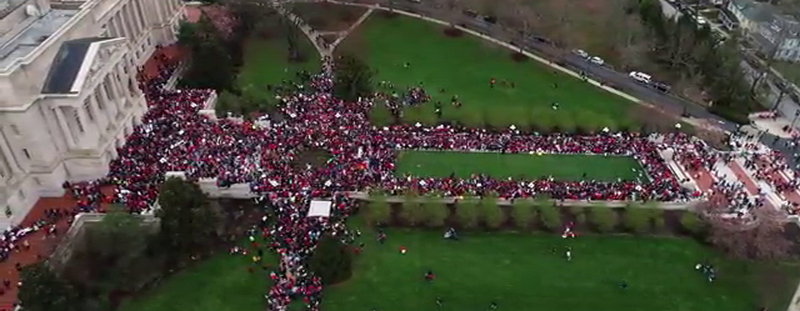

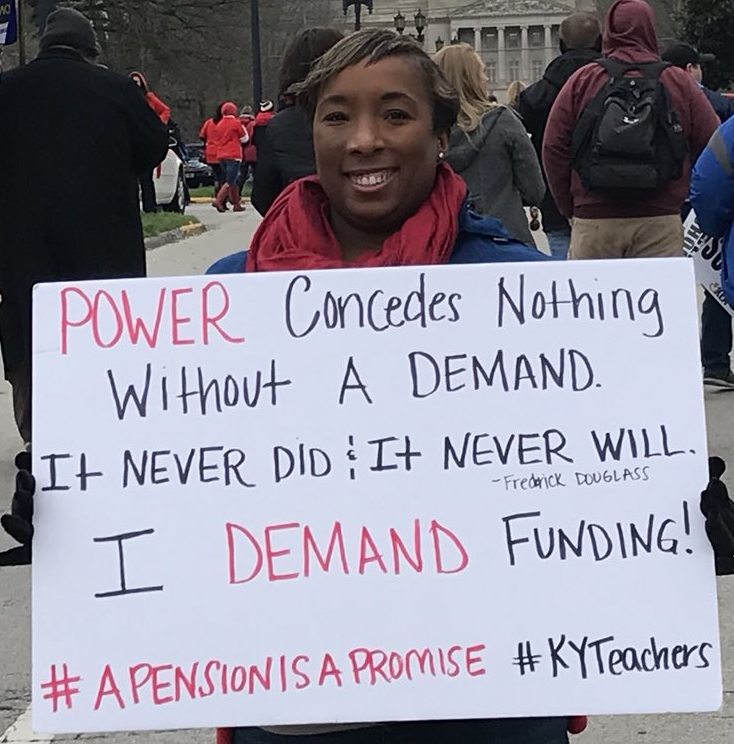
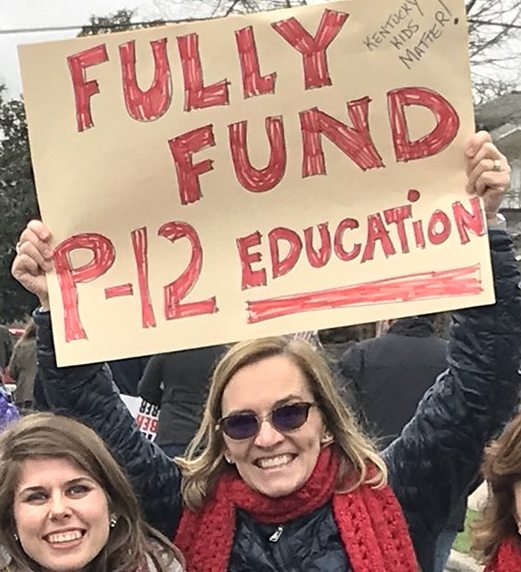
Arizona Teachers Hold Walk-Ins
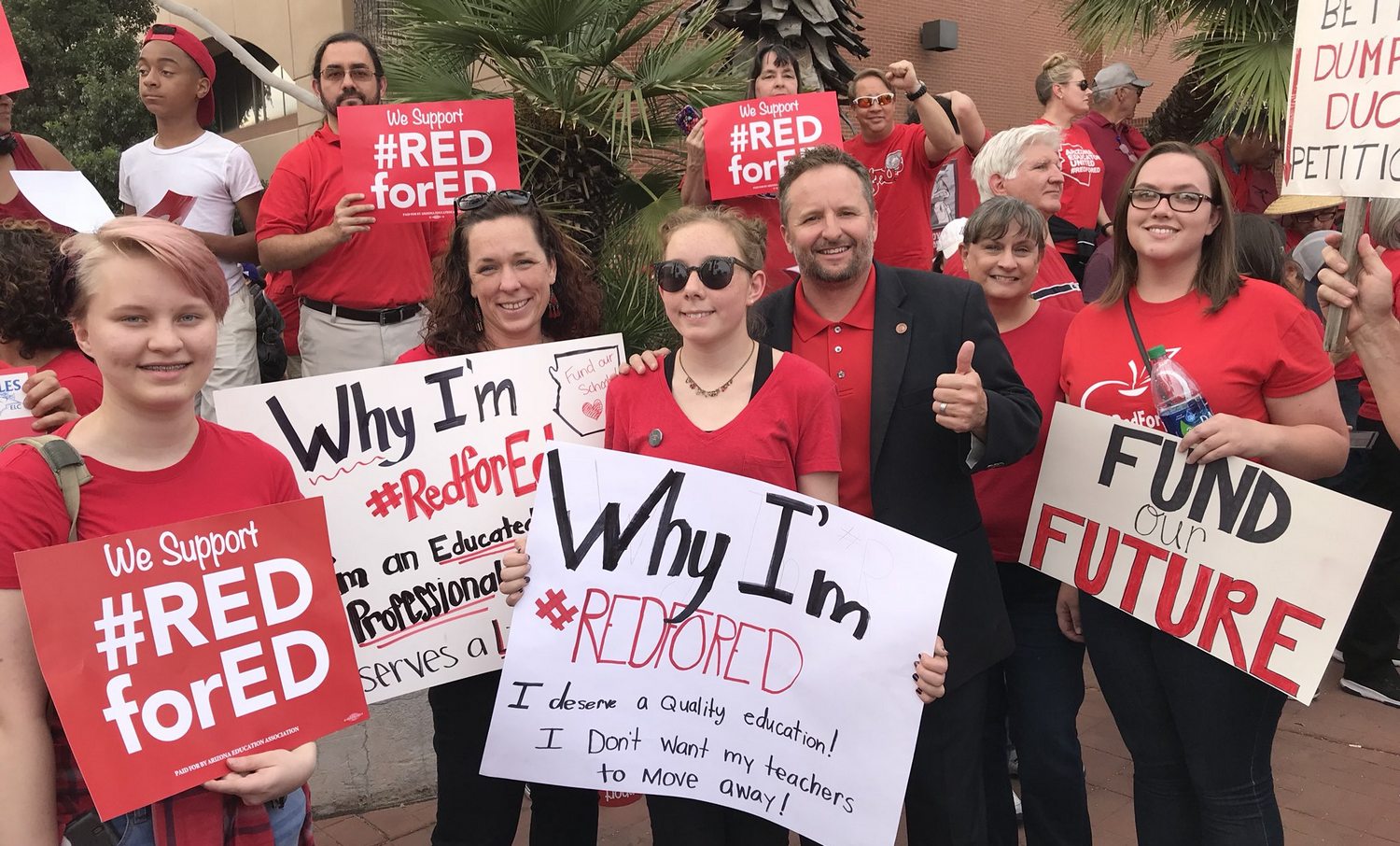
Teachers, students and school officials take part in a walk-in for
education, Tuscon, April 4, 2018.
Teachers in Arizona are also fighting for increased wages and funding for the public school system. For the fifth straight week, they have demonstrated at the state Capitol in Phoenix to demand increased funding for education and a 20 per cent wage increase.
While a strike may be possible in the near future, for the moment, teachers are holding "walk-ins," where rather than calling in sick or walking out, teachers wear red and gather at a flagpole or other central location in front of their schools to talk with parents about conditions in their classrooms and other reasons for protesting, according to Noah Karvelis.
Karvelis is a music teacher at Tres Rios Service Academy in Tolleson and one of the lead organizers for Arizona Educators United, which started as a private Facebook group for teachers and administrators that now has more than 40,000 members.
"Those conversations are powerful," Karvelis said. "If you live in this state, you have a vested interest in this movement. It's going to be powerful to see what happens next week."
On April 11, Arizona Educators United has called for a
day of
state-wide walk-ins.

Walk-in for education in Chandler, April 4, 2018.
(With files from OEA, KEA, NBC, Aljazeera, AZ Central. Photos: J. Rasnic, K.C. Greer, L. Kovacs, N. Walden Poublon, M. Simons, Workers' World, A. Murphy, AJ+, J. Pool, A. Slitz, KEA, B. Pugliano, E. Carter, Pima County Superintendant, Mr. Ruiz)
Opposition to Attempts to Hijack Democratic Process in Brazil
Huge Show of Support for Lula as Judicial Farce Continues to Violate His Rights
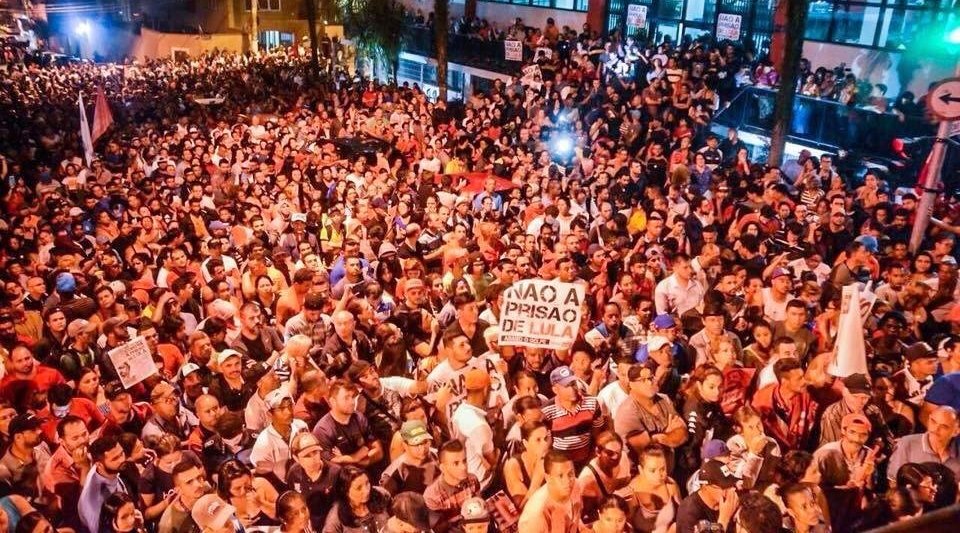
In the early hours of April 5 judges on Brazil's Supreme Court voted 5-5 against a habeas corpus filed by the defence team of former President Luis Inácio Lula da Silva. The tie was broken by the chief justice, making it a 6-5 decision against Lula. The decision violates his constitutional right to the presumption of innocence until all appeals of his conviction on bribery charges -- handed down in the absence of any evidence -- are exhausted. Later that day, the same judge who convicted Lula, in what has been described as a judicial farce aimed at preventing him from being able to run (and likely win) October's presidential election, issued an arrest warrant and gave him 24 hours to turn himself in and start serving a 12-year prison sentence.
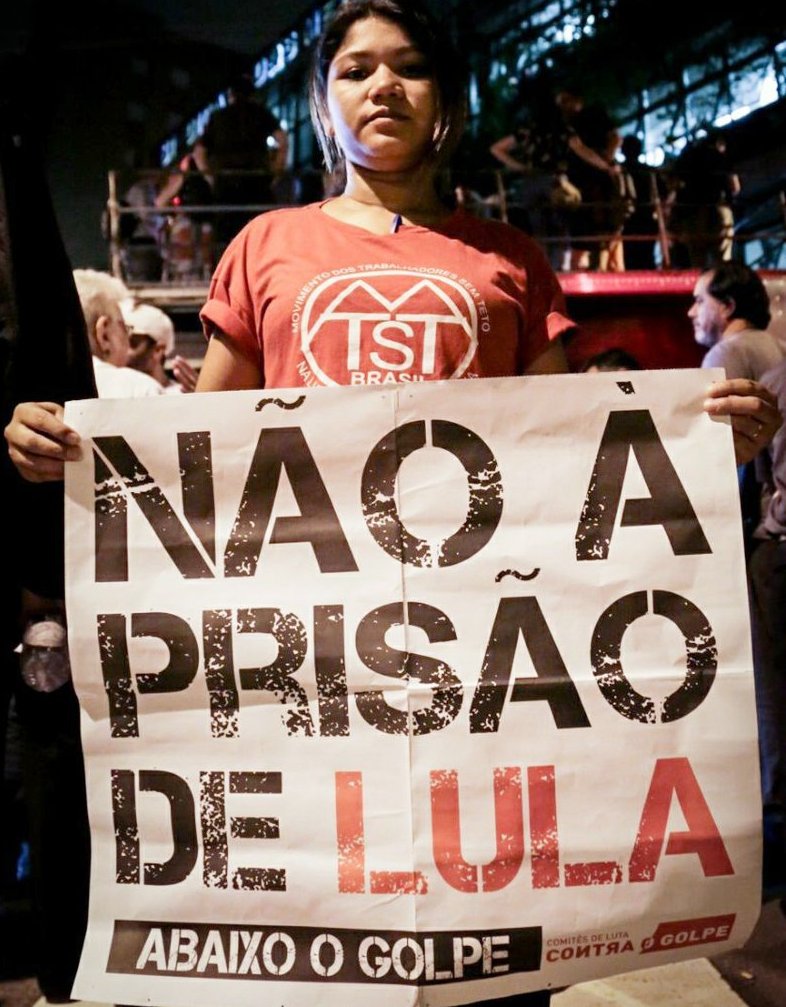
Immediately after the arrest order was issued, thousands of Brazilians began gathering outside Lula's apartment and the ABC Metalworkers' Union headquarters in Sao Paulo where he has been staying, to maintain a permanent vigil in solidarity with him and to denounce the arbitrary arrest warrant and other violations of his rights. Large crowds took to the streets in other parts of Brazil as well, imbued with the same spirit of resistance.
Lula remained at the union hall past the deadline he was given to surrender, accompanied by many friends and members of the Workers' Party, longstanding political allies like the Communist Party of Brazil, Metalworkers' Union members, intellectuals, artists, members of the legal community and many others. Rather than turn himself in, Lula said the police would have to come and arrest him publicly in front of his supporters.
The Communist Party of Canada (Marxist-Leninist)
condemns the political persecution of President Lula by the coup
government in Brazil and the judicial apparatus and stands with the
Brazilian people in action fighting to take back their country from the
forces of retrogression who have usurped power by force. It is an
absolute farce that those forces in Brazil who have seized power by
manipulating the prerogative police powers wielded by the Executive
Office of the Government and the Supreme Court do all these illegal
things in the name of democracy and anti-corruption and declare them
legal! It is also an absolute farce that countries such as the U.S. and
Canada, who are screaming about a lack of democracy and claim
corruption in Venezuela, are silent about what is going on in Brazil.
They are not only silent but stand as a united front of reaction to
restore illegitimate counter-revolutionary governments all over Latin
America as can be seen at the Summit of the Americas being held in
Lima, Peru.
Canadians stand as one with the people of Brazil against whom this coup
is directed. The reactionary forces desperately hope that criminalizing
the people's fight for empowerment and locking up Lula so that he
cannot contest the presidency of Brazil will deal a fatal blow to the
people's demand for justice and stop the progressive forces from
forming the next government. They will be proven wrong. The striving of
the people for empowerment is permanent and will carry on no matter
what crimes the reactionary forces commit. Furthermore, the people of
Brazil, who suffered so much under military dictatorships and the
oppressive neo-liberal rule of the financial oligarchs, have learned a
great deal about how to fight back and turn historic successes into
final victory. Try as they might, the reactionary forces who have
usurped power in Brazil will not solve the problem of their own
illegitimacy. They are being taught a lesson by the Brazilian people.
All out to stand shoulder to shoulder with former Brazilian President
Inácio Lula da Silva, his Workers' Party and the Brazilian
people!

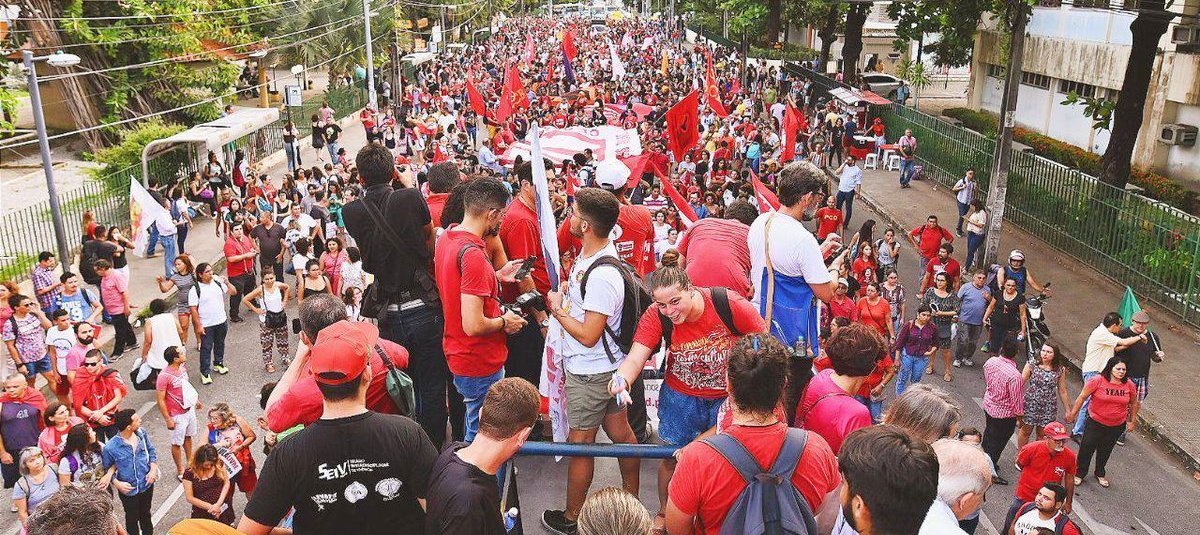
(Photos: PT, G. Martins)
International Gathering in Solidarity with Venezuela
Declaration of Caracas
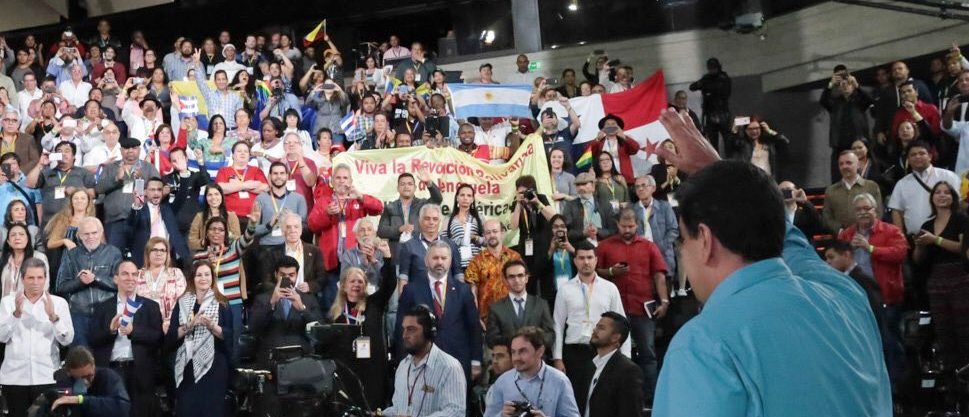
President Maduro addresses International gathering "We Are All
Venezuela," in Caracas,
March 6,
2018.
From March 5-7, an international gathering in solidarity with the Venezuelan people's right to self-determination and sovereignty was held in Caracas under the banner "We Are All Venezuela." It brought together some 300 activists from 65 countries with several hundred members of social movements, parliamentarians and others from Venezuela. The event was held concurrently with the 15th Summit of the Bolivarian Alliance for the Peoples of Our America -- Peoples' Trade Agreement, also held in Caracas, and activities commemorating the fifth anniversary of the March 5, 2013 passing of the historic leader of the Bolivarian revolution, Hugo Chávez.[1]
At the closing session of the gathering, a joint declaration adopted by participants and reprinted below, was read out.
Caracas Declaration
We, citizens of different countries, movements and social organizations, political parties, women, youth, workers, creators and intellectuals, peasants and religious people, gathered in Caracas on March 5, 6 and 7, 2018, reaffirm our solidarity and militant support to the Venezuelan people, the Bolivarian Revolution and its peoples' government, headed by compañero Nicolás Maduro Moros.
We strongly repudiate the
very serious escalation of
aggression against Venezuela's democracy and sovereignty by the
warmongering government of Donald Trump, global corporate powers
and the military industrial apparatus of U.S. imperialism, which
seek to overthrow the legitimate Government of Venezuela, destroy
the project of Bolivarian democracy and seize the resources of
the Venezuelan homeland.
We denounce this operation against Venezuela, which is part of a global neocolonization strategy for Latin America and the Caribbean, that seeks to impose a new era of vassalage and looting on our peoples, through the resurrection of the shameful Monroe Doctrine, a plan already underway in several countries of the continent.
We repudiate Donald Trump's threat of a potential military intervention in Venezuela and warn that such statements are not mere charlatanism. The military option against the Bolivarian Revolution is part of the U.S. geopolitical strategy and doctrine for the 21st century. The world must be aware of the fact that a military aggression against Venezuela could cause a crisis of historical dimensions and innumerable and unpredictable human, economic and ecological effects in the region.
We warn imperialism and the lackey elites who follow its lead: the peoples of Latin America, the Caribbean and the world are never going to allow Venezuela to be touched by the ambition of the U.S. military boot! If based on their insane obsession, Washington's hawks dare to attack Simón Bolívar's homeland, it will be, once more as it was 200 years ago, the grave of an empire.
We denounce the blatant pressure by the U.S. empire on governments of the region in order to involve them in political, diplomatic, and even military operations against the Bolivarian Republic of Venezuela. Such action seeks to destroy regional integration, and de facto abolish the principle of the founding charter of the Community of Latin American and Caribbean States that declares the region a zone of peace.
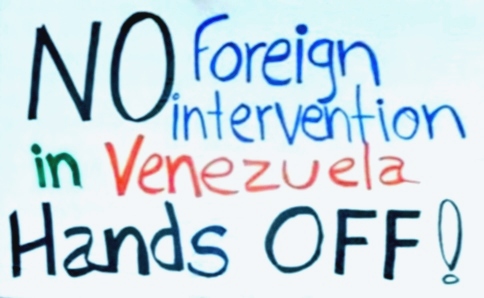 We reject the shameful and
anti-historical attitude of governments of the region that have
prostrated themselves to Washington's policy, through the creation of
illegal and spurious bodies such as the so-called Lima Group. The
pitiful regional elites that today lead the looting of their peoples --
handing over sovereignty to the transnationals, increasing poverty and
inequality and violating human rights -- lack any kind of moral and
political authority to question Venezuelan democracy.
We reject the shameful and
anti-historical attitude of governments of the region that have
prostrated themselves to Washington's policy, through the creation of
illegal and spurious bodies such as the so-called Lima Group. The
pitiful regional elites that today lead the looting of their peoples --
handing over sovereignty to the transnationals, increasing poverty and
inequality and violating human rights -- lack any kind of moral and
political authority to question Venezuelan democracy.
We reject the unilateral and illegal sanctions of the U.S. Government and the European Union against the Venezuelan people aimed at destroying their economy and subduing their democratic will. Blockades and sanctions are crimes against humanity committed by the international capitalist system that are seriously impacting the Venezuelan people by sabotaging the productive, financial and commercial processes and preventing access to food, medicines and staple goods.
We repudiate the perverse U.S. sabotage of the dialogue held in the Dominican Republic and reiterate that the only way to determine the path to recover the political coexistence between Venezuelans is through full respect for the sovereignty of Venezuela, non-interference in its internal affairs, sincere dialogue and electoral processes based in Venezuelan legislation.
In this regard, we welcome the call for presidential, state legislature and council elections next May 20, the result of a political agreement with a sector of the Venezuelan opposition. Through these absolutely legitimate and constitutional elections the Venezuelan people will decide the course of the homeland in a transparent and sovereign manner.
We alert the peoples of the world to the malicious intention of governments and international bodies directly involved in the war on Venezuela not to recognize the results of the May 20 election and to increase attacks against what will undoubtedly be an authentic democratic expression of the Venezuelan people.
We welcome and endorse the Declaration of the Presidential Summit of the Bolivarian Alliance for the Peoples of Our America (ALBA-TCP) that categorically rejects the exclusion of Venezuela from the next Summit of the Americas, to be held in Lima, Peru. Likewise, we support all the diplomatic and political actions undertaken by governments, countries and peoples to defend political pluralism and diversity on the continent, and safeguard the sovereignty and self-determination of peoples.
We recognize the heroic
resistance of the Venezuelan people
against the onslaught of economic aggression, the financial
blockade and all forms of sabotage that Venezuela is suffering
and we support the economic, financial, political and diplomatic
strategy implemented by the Bolivarian Government and President
Nicolás Maduro, to overcome the problems and for the building of
the humanist model of Bolivarian Socialism.
We commit ourselves to continue fighting for the truth, peace and the sovereignty of Venezuela, expanding the bonds of friendship, solidarity and revolutionary commitment with the Venezuelan people. The peoples of the world, the conscience of all those who fight for the just causes of humanity, accompany the Bolivarian Revolution, its leadership and its people at this time, and will always do so.
We are convinced that Venezuela will know how to overcome through dialogue, respect for the Constitution, and the unwavering democratic will of its people, the problems that afflict it. We are also convinced that the Bolivarian Revolution will continue to be a beacon of hope for the peoples of the world in search of a dignified and just destiny for humanity.
In commemoration of the five years since the passing of Commander Hugo Chávez, historical leader of the Venezuelan people, from Caracas we say to the world: Venezuela is not alone, we are all with her! We are all Venezuela! Venceremos!
Note
1. "Events in Venezuela Highlight Significance of Bolivarian Revolution," TML Weekly, March 17, 2018.
(Edited slightly for publication by TML.)
8th Summit of the Americas and Parallel
Peoples' Summit to
Be Held in Lima, Peru
Peoples' Forces Speak for Themselves in the Face of
Imperialist Bullying and Exclusion
This year the 8th Summit of the Americas is taking place in Lima, Peru on April 13-14. Its theme is "Democratic Governance Against Corruption." Created in 1994 by the United States during the administration of Bill Clinton to push the failed Free Trade Area of the Americas, the Summits continue to be held every three years. The last one was held in Panama City in April 2015.
Peoples' Summit to Foster Continental Solidarity
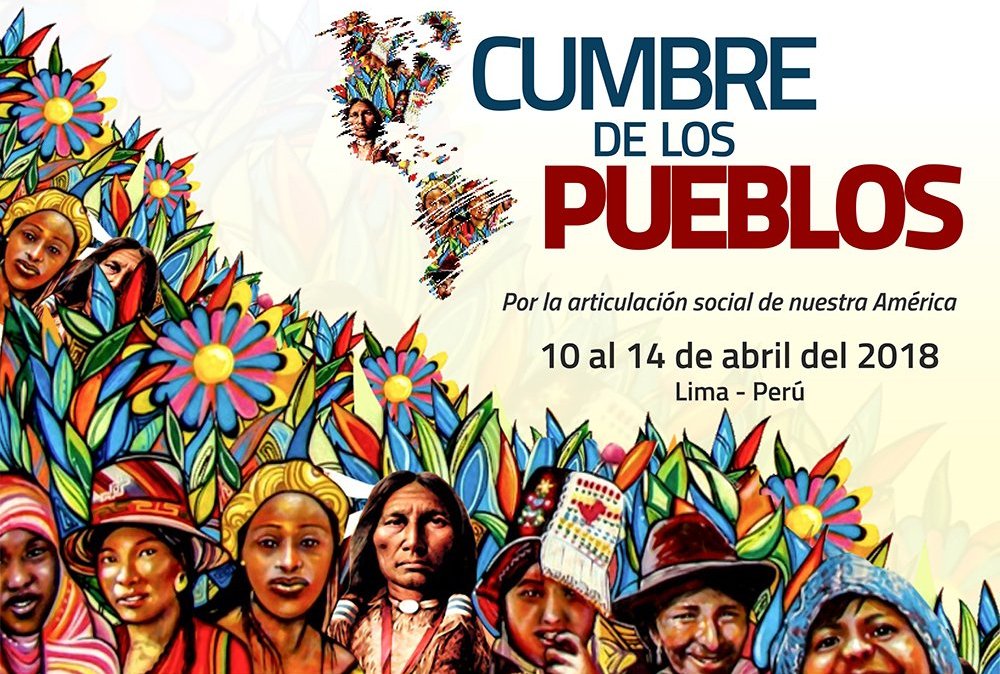
As has become customary, a parallel Peoples' Summit will
be held in Lima from April 10 to 14, organized by the Peruvian General
Workers' Federation together with different social movements and a
number of political parties. The "People's Summit and Great Act of
Continental Solidarity," as the title suggests, has as its theme the
unity of the peoples of Our America.
In a call to organizations and groups all over the Americas to participate in the five-day gathering, the organizers state: "Faced with the interventionist imperialist offensive on the part of the U.S. government led by Donald Trump, we are taking up the defence of our national sovereignty and regional integration with our own voice." In addition to plenary sessions and smaller group meetings to discuss the many problems facing the peoples of the region and their societies and what it will take to overcome them, the planned events include a cultural-political festival and an anti-imperialist march. A number of current and former heads of state from Latin America and the Caribbean are reported to have accepted the invitation to participate in the Peoples' Summit.
Opposition to Imperialist-Orchestrated Attempt to Isolate Venezuela
The 8th Summit of the Americas is taking place at a time when sharp contradictions have emerged, as more and more of the moribund forces headed by U.S. imperialism resort to police powers and brute force in a desperate effort to stop the new from emerging that the peoples' forces are striving to bring into being. What else can explain the attempt by the U.S. to resurrect its almost 200-year-old Monroe Doctrine to justify aggressively reasserting its hegemony over its "back yard"?
The irrationality has reached such an extent that in spite of sitting presidents in the region assuming office through illegal coups and blatant electoral fraud, some of them presiding over the massive violation of their citizens' rights, with social and political activists, journalists and others assassinated with impunity almost every day, it is Venezuela that they want to put in the dock in Lima. Those who would condemn Venezuela themselves engage in every manner of corruption (which ironically brought down Peru's own neo-liberal president less than a month before he was to preside over this Summit against corruption). The U.S. maintains a genocidal blockade against Cuba, has instituted another one against Venezuela and routinely issues threats against other nations and peoples aimed at forcing them to submit to its will. Not only do these rogue forces want to use the Summit to attack Venezuela, but the illegitimate "Lima Group," with Canada playing a lead role and the U.S. pulling the strings from behind, has decided the Bolivarian government and its president should be barred from even attending. Meanwhile Donald Trump will be welcome to come and issue threats left and right to the inhabitants of what the U.S. considers its "back yard."
But it will not be so easy for the U.S. and the Lima Group to accomplish their aims. Countries that continue to uphold their dignity by refusing to submit to pressure from the U.S. bully and its lackey Canada to join their campaign of meddling in Venezuela's affairs include some of the smallest Caribbean states. Antigua and Barbuda's Ambassador to the Organization of American States (OAS) and Summit of the Americas process, Sir Ronald Sanders, said the government of Venezuela was excluded without any prior explanation or discussion by OAS member states at any level, adding that it was unacceptable and a dangerous precedent for a host country to unilaterally ban a member state from attending a Summit. His country's delegation walked out of a March 8 preparatory meeting for the Summit saying it would not return until the situation was rectified.
Other countries that have publicly denounced Venezuela being uninvited include Ecuador, Dominica, Cuba, Nicaragua, Uruguay and Bolivia. Undeterred, President Nicolás Maduro and the Bolivarian government say they intend to be at the Summit. Bolivia's president Evo Morales said, "We reject that a minority of countries directed by Trump's interventionist obsession wants to turn the Summit of the Americas into a coup instrument against Venezuela. Attacking a democratically-elected president is attacking the people who elected him."
Cuba's Voice
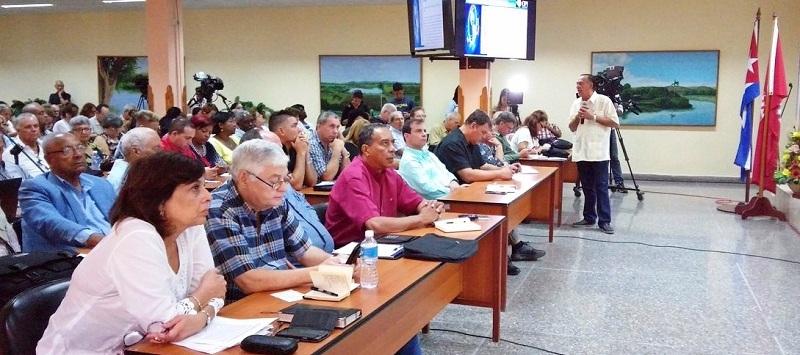
Second of two "Thinking About the Americas" forums held in Cuba, March
22, 2018. (Radio Rebelde)
Although Cuba has said it will never rejoin the OAS -- it was expelled in 1962 on an anti-communist basis -- despite being extended an official invitation to return in 2009, President Raúl Castro did accept an invitation to attend the 2015 Summit in Panama. He has been invited to Lima as well.
In anticipation of Cuba's participation at the Summit and at the "Civil Society and Social Actors Forum" taking place in conjunction with it on April 11-12, two "Thinking about the Americas" forums were organized in Cuba last month -- one to engage representatives of different sectors of Cuban society and the other to engage members of Cuban youth and student organizations in deliberating on the three sub-themes of the Summit: a) Democratic Governance and Corruption; b) Corruption and Sustainable Development and c) Corruption, International Institutions, and Public-Private Partnerships. Both forums concluded with participants adopting declarations that summed up their deliberations.
Addressing the stated theme of the Summit head-on, the youth declared:
"The fundamental theme of the 8th Summit of the Americas is 'Democratic Governance and Corruption.' The young people gathered evaluated that the main cause of corruption is neo-liberalism, which is essentially a system that generates selfishness, individualism and profit-seeking at all costs and makes the distribution of wealth and income and access to essential services very unequal, as occurs in Latin America and the Caribbean."
They called attention to what they said was the increasing use of legal processes to pursue political ends, especially against progressive leaders who are charged with corruption while the will of the people is ignored, and transnational corporations continue to evade taxes and plunder the people's resources with impunity and to pay corrupt judges to avoid legal proceedings. They said corruption needed to be dealt with rigorously, but without the double standards and hypocrisy seen today where the wealthiest people are able to avoid being brought to justice.
Among other things, the groups:
- demanded the lifting of the U.S. economic, commercial and financial blockade that they said violates the rights of the Cuban people and impedes Cuba's ability to achieve the goals of sustainable development;
- rejected Venezuela's exclusion from the Summit and expressed support for the people and government of the Bolivarian Republic of Venezuela and their right to self-determination and to independently choose their own social system for the well-being of their nation;
- rejected the presence at preparatory events in Lima for the Civil Society and Social Actors Forum of "Cuban-born citizens and mercenary organizations" in the service of foreign governments and institutions and without any recognition or legitimacy, who seek only to overturn the social and political system that Cubans, in a sovereign and democratic manner, have adopted for themselves;
- denounced the aspirations of imperialism and the conservative oligarchy in the region to revive "the infamous Monroe Doctrine" in an effort to restore U.S. hegemony and impose neo-liberalism on all of Latin America and the Caribbean; and
- called for upholding the principles of the "Declaration of Latin America and the Caribbean as a Zone of Peace" as a tool for achieving the stability needed to tackle corruption, eradicate poverty and economic and social inequality and to be able to achieve the goals of sustainable development.
Cuba's voice at all the venues in Lima promises to be an important and unifying one.
(With files from Granma, Cubadebate, Resumen Latinoamericano, teleSUR, ALAI)
Website: www.cpcml.ca Email: editor@cpcml.ca
